Agriculture & Environment
Mak Flags off 244 Ugandan University Students for Agrostudies Internship in Israel
Published
4 years agoon
By
Jane Anyango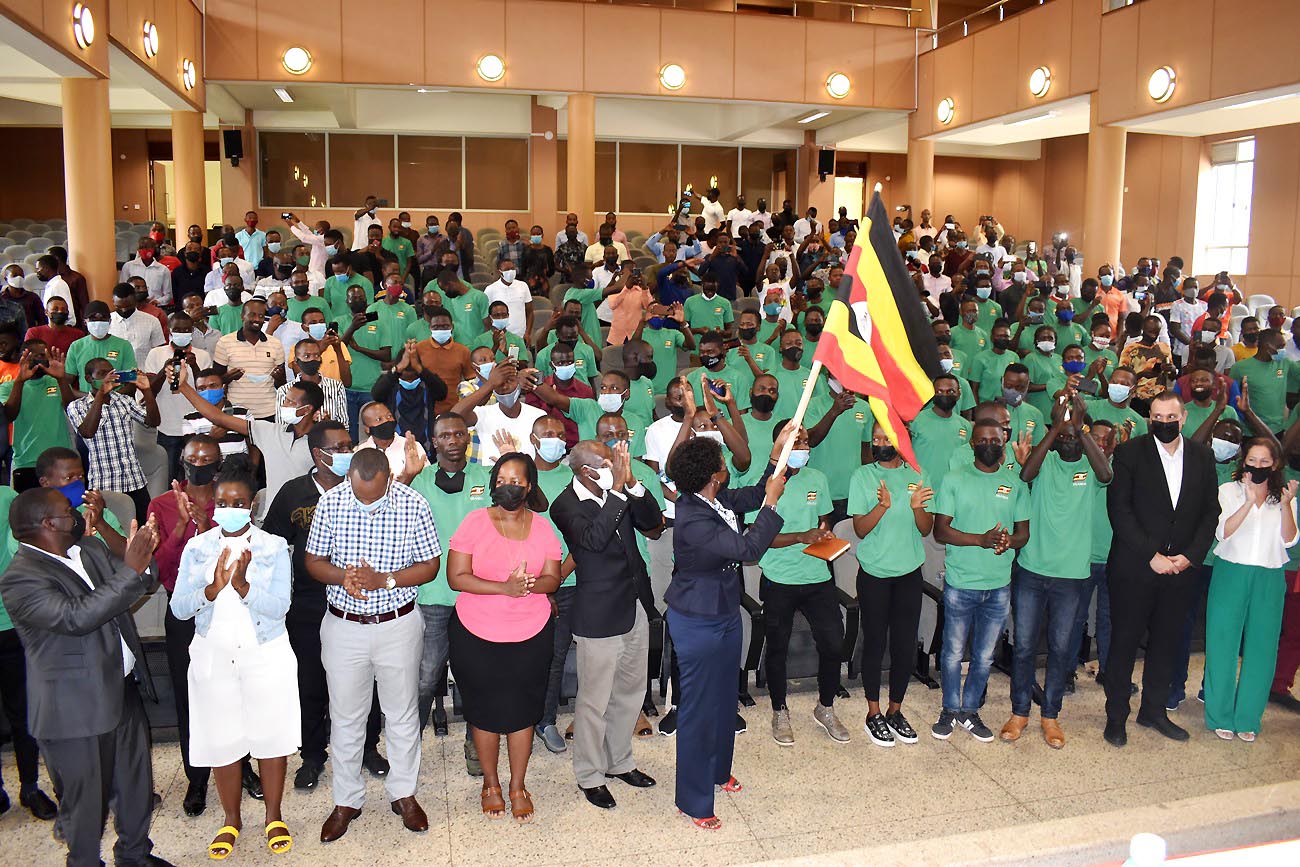
244 students from five universities – Makerere, Kyambogo, Gulu, Busitema and Bishop Stuart University have been flagged off to Israel for a one year paid internship. 10 out of the 244 flagged off are female.
The students were flagged of by the Vice Chancellor of Makerere University represented by the Deputy Vice Chancellor in charge of Finance and Administration (DVCFA) Assoc. Prof. Josephine Nabukenya on 13th October, 2021 at a colorful ceremony held in the Central Teaching Facility 2 (CTF2) Auditorium, Makerere University.
The function was also attended by a team from the Agrostudies center in Israel led by the CEO Mr. Yaron Tamir, representatives from the participating Universities in Uganda, Principal, College of Agricultural and Environmental Sciences (CAES), Alumni and Coordinators of the Agrostudies Apprenticeship Programme from the five universities.
Prior to the flag off, the Mr. Yaron Tamir and his deputy paid a courtesy call on the Vice Chancellor where they discussed matters of interest to the university and the Government of Uganda especially a plan to start an Agrostudies Alumni Cooperative in Uganda and the possibility of the program Alumni to support Government in providing extension services.
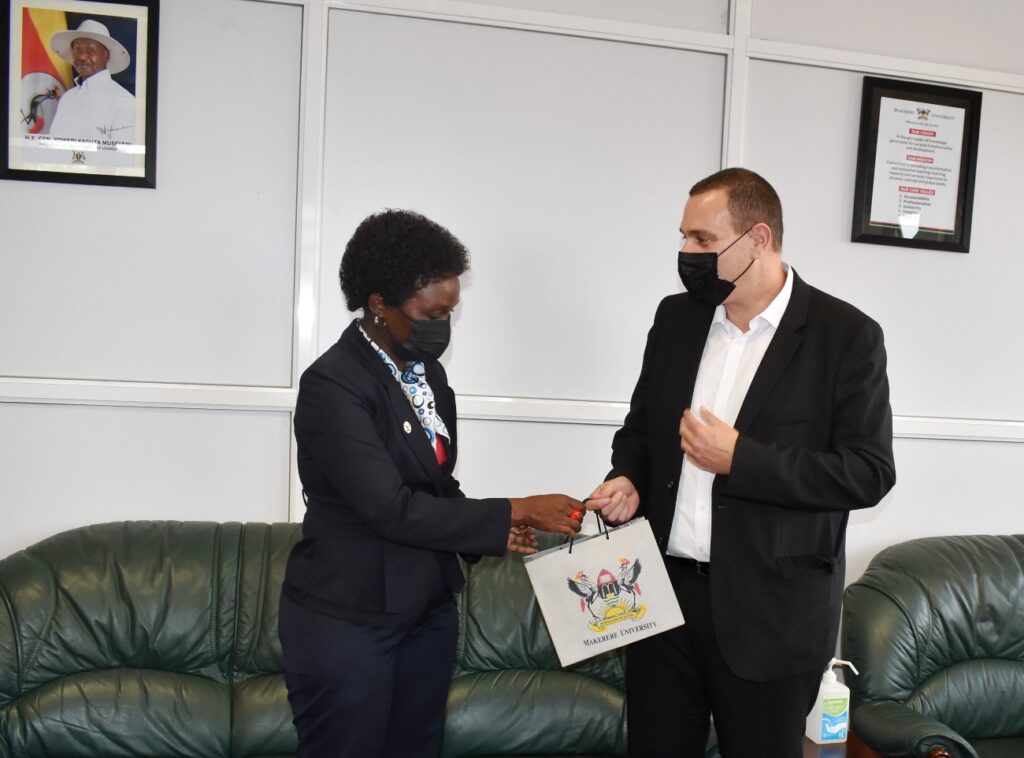
The Agrostudies cohort 2021/2022 was organized under the theme, “Securing the Future of Uganda through Agriculture Capacity Building”. At Makerere University, the programme was coordinated by Dr. Mildred Ochwo-Ssemakula and Dr. Narisi Mubangaizi from the School of Agricultural Sciences, College of Agricultural and Environmental Sciences (CAES).
The students’ participation in the Agrostudies agriculture capacity building program is a response to the need to transform from subsistence to more commercial agriculture in a bid to secure the future of Uganda.
Presiding over the function as Chief Guest, Assoc. Prof. Josephine Nabukenya welcomed all to Makerere describing the University as a warm and peaceful community.
The Deputy Vice Chancellor reported that Uganda is grappling with several development challenges including low agricultural production and productivity, negative attitude of youth towards agriculture and high rates of unemployment among the youth.
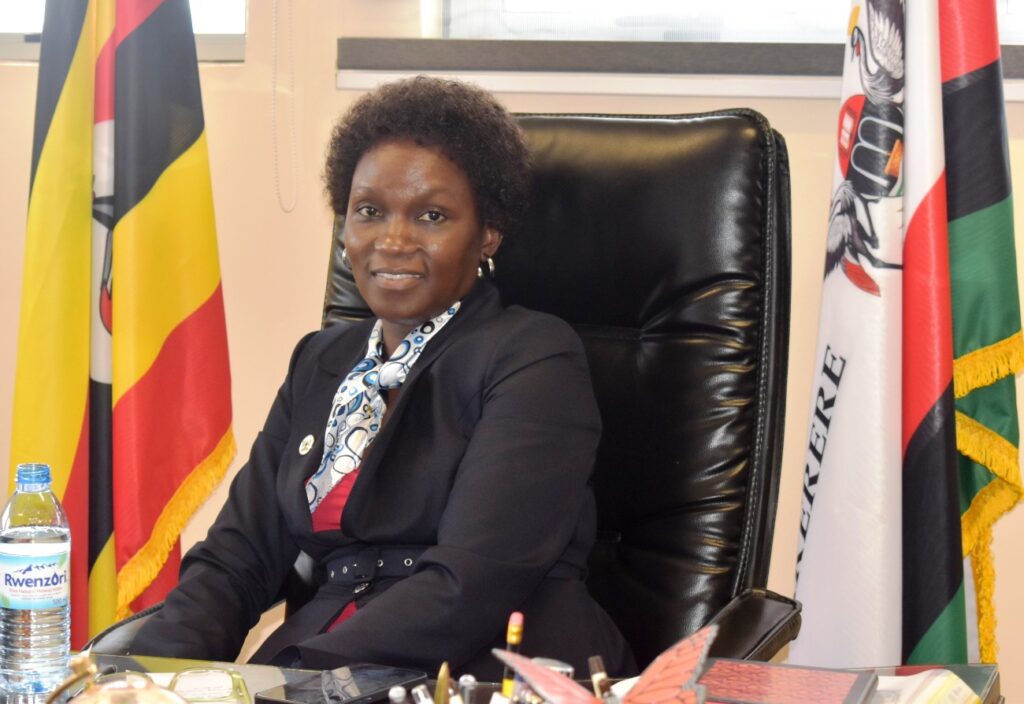
She noted that the Agrostudies apprenticeship programme which aims at exposing Ugandan University Students to modern agricultural technologies in agriculture has a huge potential to deal with these development challenges.
Dr. Nabukenya said most of the students that have participated in the agrostudies apprenticeship programme have set up agricultural enterprises in which they have applied knowledge, skills and financial resources acquired from the programme.
On behalf of Makerere University and all participating universities in Uganda, Prof. Nabukenya appreciated the foresightedness of the Israeli and Ugandan Governments for coming up with this wonderful programme
“By setting up agricultural enterprises, these students have become job creators rather than job seekers. These agricultural enterprises set up by alumni of the Agrostudies apprenticeship programme are also helping in transferring technologies from Israel to other farmers in Uganda,“ she stated.
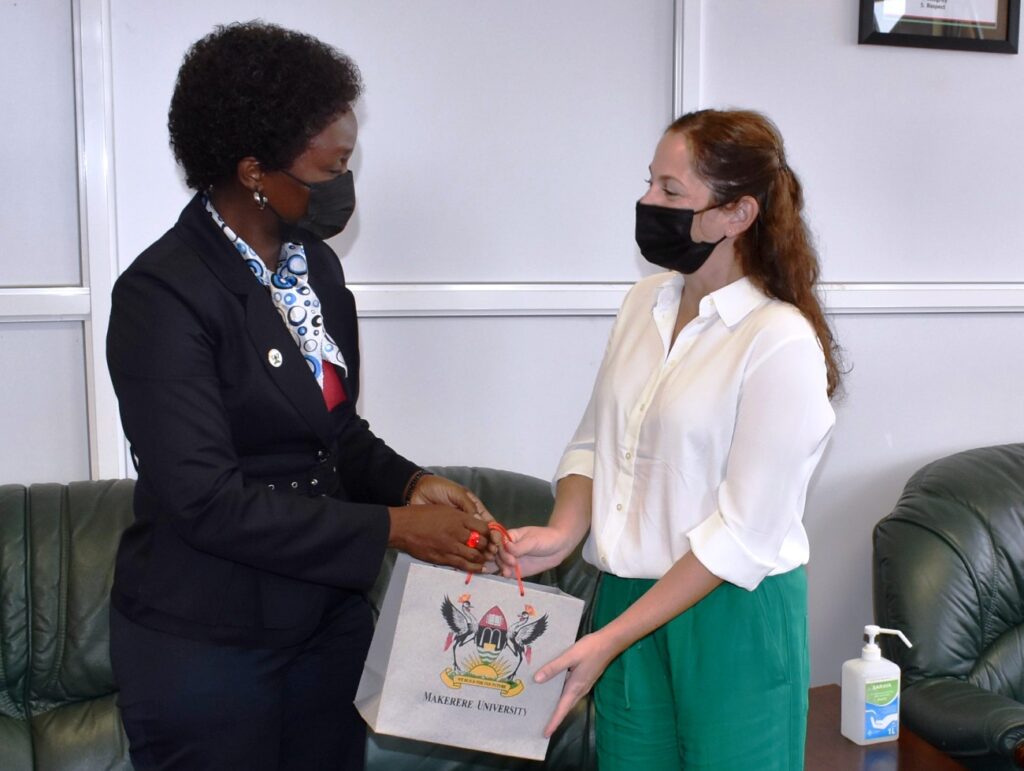
Dr. Nabukenya expressed gratitude to the governments of Uganda and Israel for entrusting Makerere University with the noble responsibility of being the national coordinator for the Agrostudies program in Uganda and pledged total commitment towards the programme’s success and continuity.
She said, the university has embarked on the process of institutionalizing the programme where the Office of the Vice Chancellor has mandated the College of Agricultural and Environmental Sciences (CAES) to coordinate the programme on behalf of Makerere University from 2021 onwards.
The DVCFA also thanked CAES for accepting this responsibility and for the progress so far made. As proof of the university commitment to the programme, Prof. Nabukenya said, Makerere University has provided free accommodation to all the students selected under the programme residing within the students’ halls of residence.
She appreciated the efforts made by several units of Makerere University including the Vice Chancellors’ Office, Office of the University Secretary, Finance and Accounts, University Hospital, Dean of Students and staff in the students’ halls of residence to support the programme.
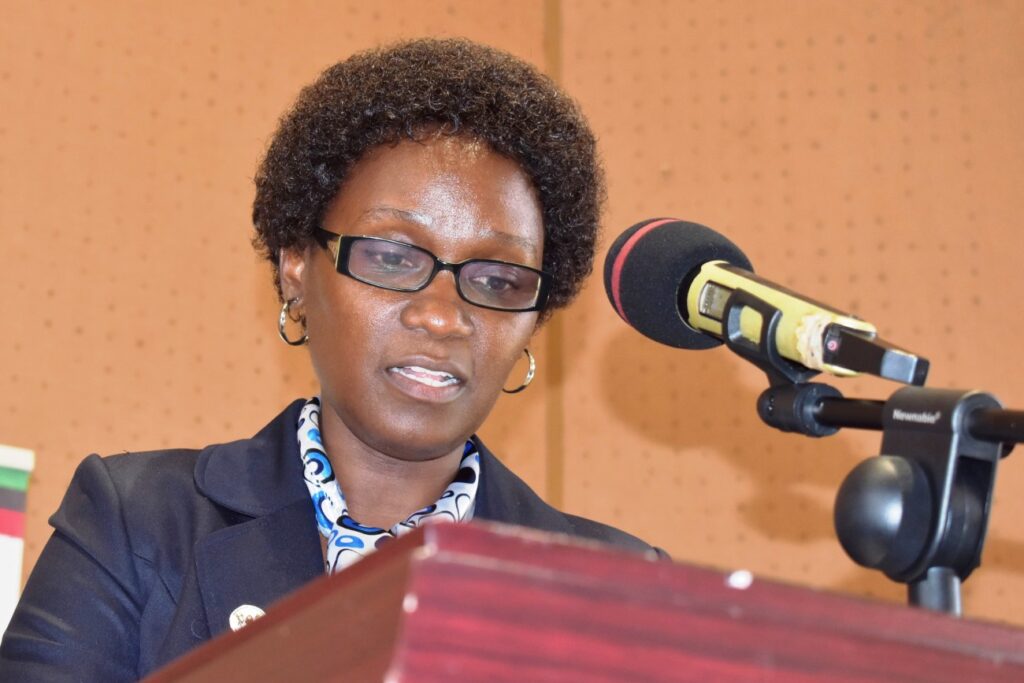
Dr. Nabukenya congratulated the students upon their successful selection for the program, a competitive process involving rigorous medical examinations as well physical fitness training to ensure that they are mentally, physically and emotionally ready for the work ahead of them.
“Please do not waste this golden opportunity. I encourage you to learn as much as you can and observe very good discipline during your stay in Israel. Above all, I humbly appeal to you to fully observe all the rules and guidelines of the programme and to return to Uganda at the end of the programme”, Dr. Nabukenya implored.
The DVCFA thanked the Agrostudies team from Israel for adjusting the earlier position regarding the non-participation of female students in the programme by enrolling 10 female students.
She however appealed to the Agrostudies Israel team to consider increasing the number of female students onto the programme in the subsequent years, saying, Makerere University is a gender sensitive institution and tries as much as possible to promote gender equity and equality by giving equal opportunities to both males and females.
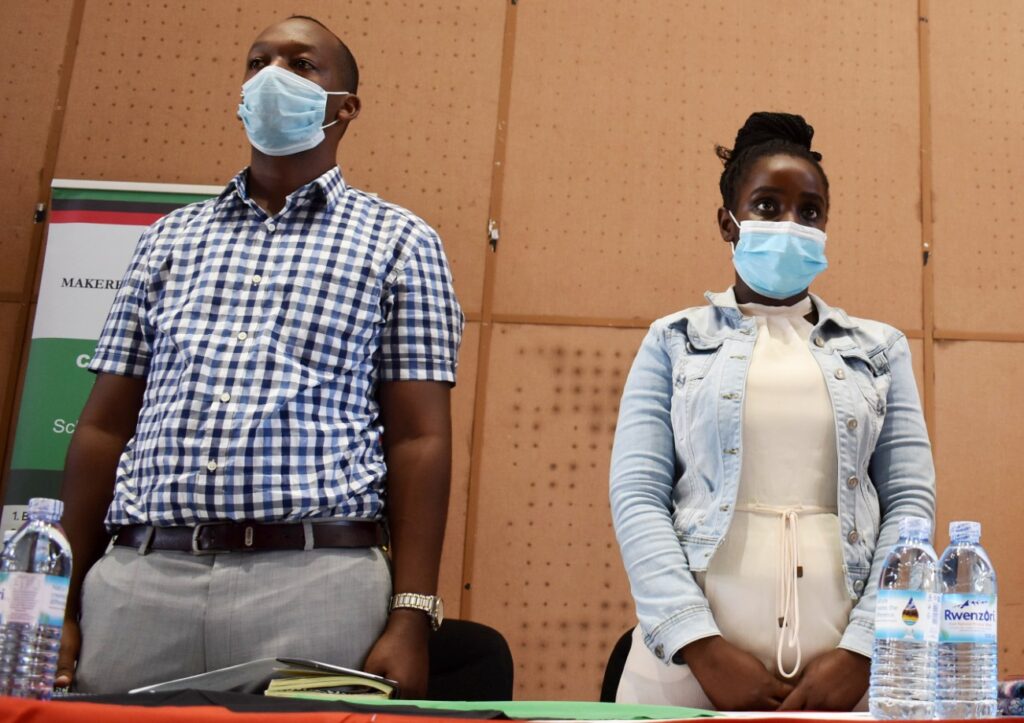
Orienting the students, the Chief Executive Officer Agrostudies program Mr. Yaron Tamir thanked Makerere University for hosting and selecting the candidates for the year 2021/2021.
Mr. Yaron said Agro studies was established 17 years ago to conduct agricultural capacity building by bringing students from different countries doing traditional agriculture to Israel to learn and practice modern agriculture. He clarified that Agrostudies is neither a university nor a replacement of a university but one has to be a university student to qualify for the program.
The CEO said Agro studies enrolls around 1,500 students every year from 14 countries including Philippines, Cambodia, Vietnam, Rwanda, Tanzania, Ivory Coast, Benin, Liberia among others. He cautioned students against laziness, escaping and staying in Israel beyond the program period.
“You are not going for summer. It involves very hard and intensive work in the field. If you feel you are not qualified or capable of doing it, this is not a place for you. It is true Agrostudies is a life changing program and we have thousands of students with amazing successful stories but you need to understand that agriculture is not done in the office, it does not involve air condition but it is hard physical work in the field”, the CEO emphasized.
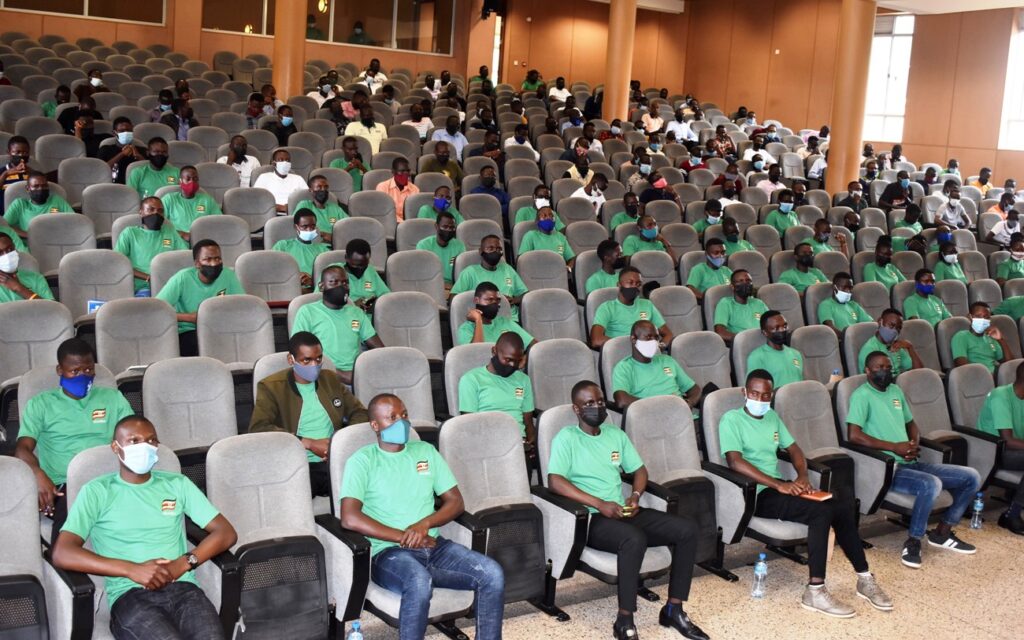
Mr. Yaron however told students not be afraid when they reach the airport saying it is their job to take care of them as mothers and fathers for the next eleven months.
“If you are sick, or have a problem back home, we are the ones to take care of you. We will be very communicative with the university in case of problems and we will solve them. We have a member of staff who will be in charge and he will visit you on the farm, check accommodation to see that everything is well and on arrival at the airport you will be availed emergency numbers”, the CEO pledged.
Yaron told students that on arrival in Israel they will be quarantined for seven days, hosted in a farm apartment and given food and other necessities but before exiting the airport they will be subjected to a PCR test at a cost of USD 20 which will be repeated after seven days at no cost but they will have to pay for a PCR test upon their return to Uganda.
He urged students to carry with them laptops for they will start school during that quarantine period through the Israel system including all courseworks and tests adding that they have to pass to get that diploma.
The CEO said, once out of quarantine, students will be vaccinated because every citizen is vaccinated with Pfitzer noting that Israel is the first country in the world that gives a booster because after 6 months of vaccination the anti-bodies disappear or become low.
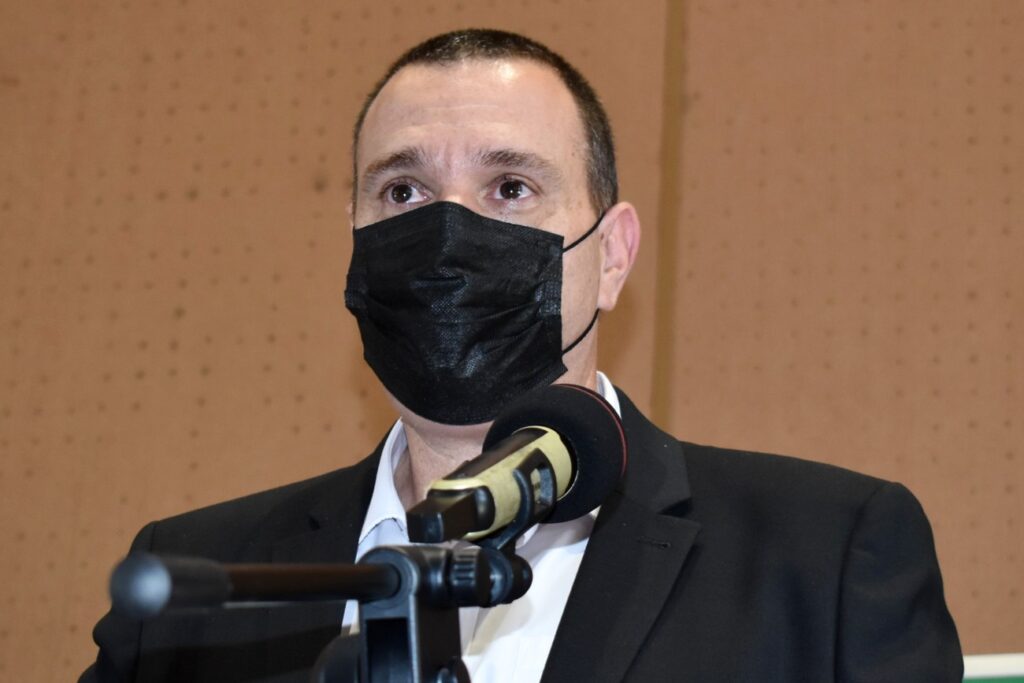
He explained that whether vaccinated or not, it does not matter as long as one is through with the quarantine period. In Israel, he said that a green tag is issued after vaccination to allow one to go to a restaurant, mall and other public places.
He reported that the Delta COVID variant was rampant but with the vaccination, the number has gone down significantly and going low day by day with anumber of PCR tests conducted.
He told students that they will be going to one of the campuses once every week to meet teachers, doctors and students from other countries and experience different courses of agriculture including crop, horticulture and dairy farming.
“Our job is to take the knowledge you have acquired here at university and transfer it into actions. Israel is a small and a highly developed agricultural nation with almost no arable land, the majority being a desert with a huge shortage of water unlike Uganda with a lot of water. And only 2% of the population grows everything the population needs and we export 150% of it because we have the technologies and this is why we hope you will experience this technology.
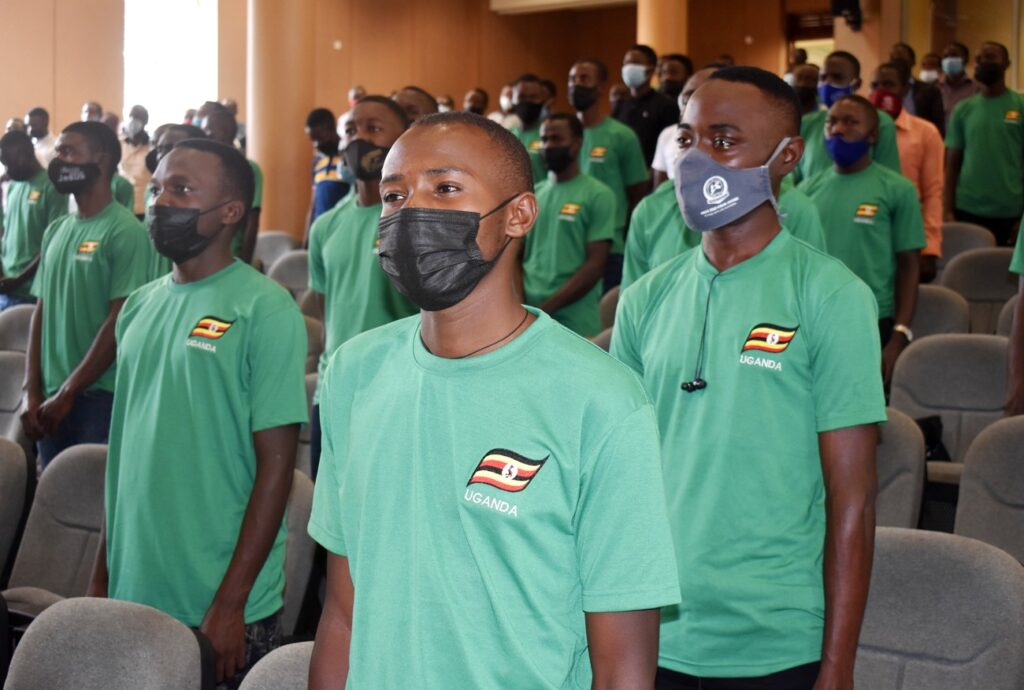
Success comes with hard work, so you will spend five days on the farm doing all farm activities, earn money for it and once you earn, it is important that you save a significant amount to help you come to Uganda and open your own business”, the CEO said
Part of the school requirement according to Yaron is for the students to prepare the agricultural protocol where they will study what the farms have and analyse them so as to help them understand how to eventually start their own agricultural business. Among other things of agricultural course is the requirement by students to prepare a business proposal with the help of Israeli experts so that once they come back, they will have the capital to start a business.
Mr. Yaron observed that unlike Rwanda where the largest cooperative is owned by 101 Agrostudies alumni and the second largest is owned by 39 Agrostudies alumni, there is not yet a cooperative owned by Agrostudies graduates in Uganda.
Yaron told students that Israel farmers are very strict with time adding that they must understand that agriculture is a very profitable business and depends on how one does it. He said, Israel used to grow mangoes but abandoned them for avocados and cherry tomatoes because they are more profitably grown using irrigation from 80% recycled domestic water.
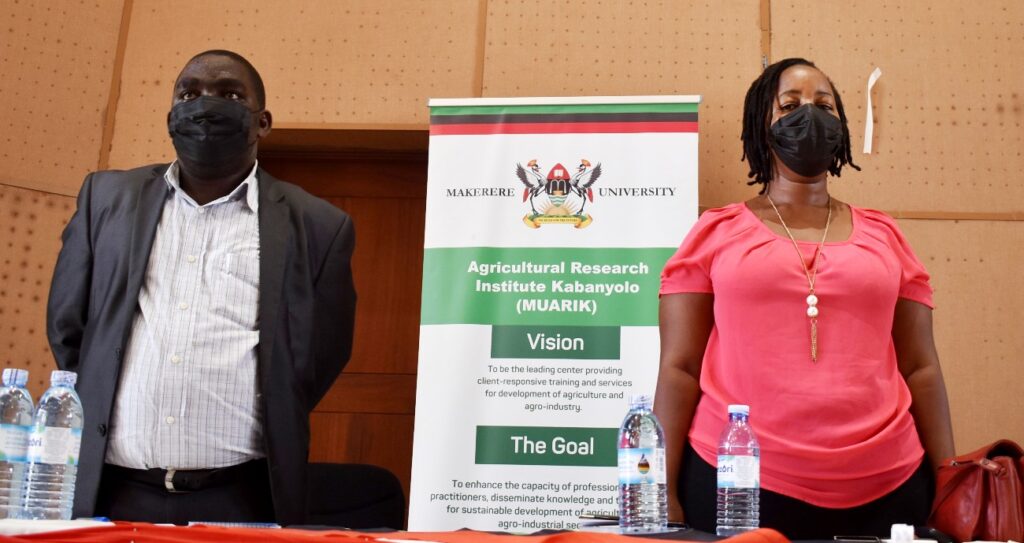
“Israel is a good country but with very hard conditions so we had to do what was possible especially using technology not to starve. You need to know you are not representing yourself but Uganda. … you are young, your future is bright. Come back and be a success story not to end with few dollars in restaurants to wash dishes”, the CEO warned.
The Principal CAES Prof. Bernard Bashaasha described the day’s event as a happy day and thanked the coordinating team from various universities for a job well done.
Prof. Bashaasha thanked the Government of Uganda and Government of the state of Israel for the political collaboration and partnerships that enables such activities to take place.
Bashaasha also expressed appreciation to the Vice Chancellors of the five participating universities for embracing the program.
He thanked Agrostudies for the vision and initiative that started in 2013 noting that seventeen years down the road, the vision has matured.
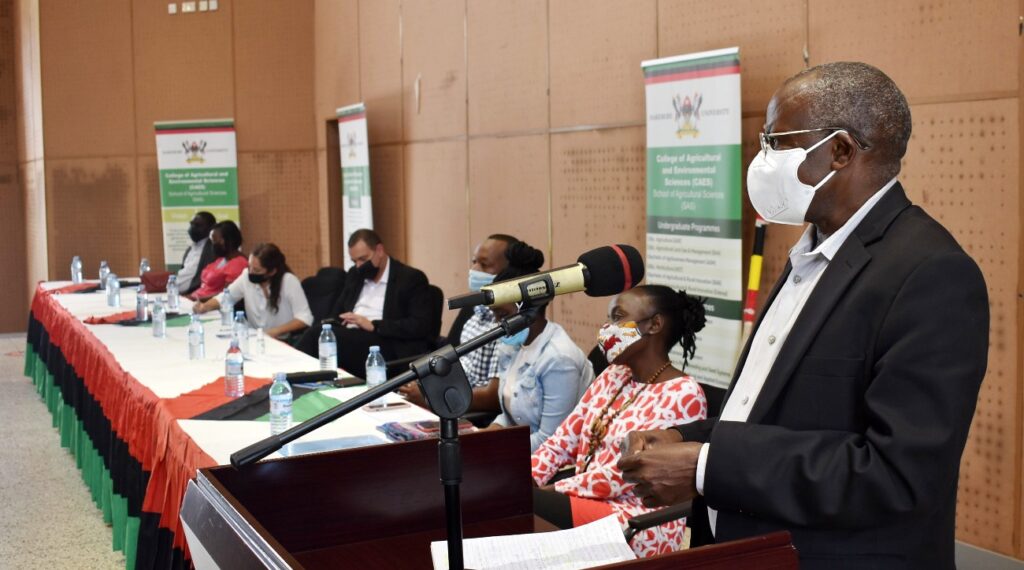
The Principal congratulated the selected students for successfully reaching the flagging-off stage and going through a stiff competition, thorough screening process and medical examination
“When you go to Israel, be good ambassadors. You are carrying the flag of Uganda and take that very seriously because it is not just a ritual but something seriously intended. When you go, please come back so as not to spoil chances of your other colleagues and the implementation of the program”, Bashaasha advised.
Prof. Bashaasha appreciated the Government of Uganda for putting up a policy framework that allows such activities to happen.
He said the Agrostudies activity being conducted in various universities here is anchored in the government policy on guidelines of Technical and Vocational Education Training (TVET 2009) in the Ministry of Education and Sports.
Giving oversight of this, Prof. Bashaasha said, is the TVET Council which provides guidelines with eleven key parameters which stipulate that there has to be a governance structure, some remuneration, a written contract, social security coverage, a legal framework, the program of learning, on-off job training, formal assessment and within the duration of one to four years.
Jane Anyango is the Principal Communication Officer, College of Agricultural and Environmental Sciences (CAES)
You may like
-
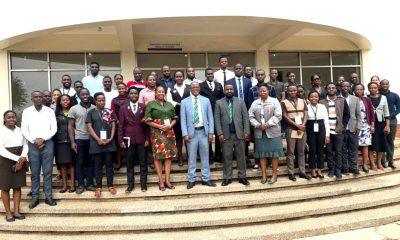

Mak Moves to Revitalize Food Technology & Business Incubation Centre to Drive Innovation & Entrepreneurship
-
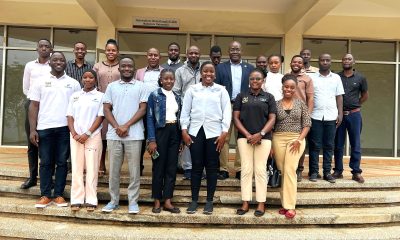

SophiA Project Upgrades Medical Infrastructure at Buvuma Health Centre IV, Trains Technicians for Maintenance Works
-
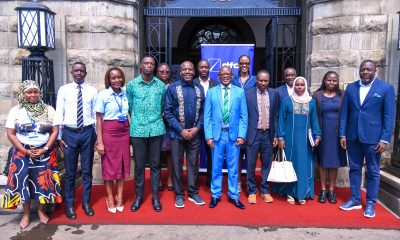

Makerere University, DFCU Bank Sign MoU to Advance Innovation, Student Leadership and Research
-
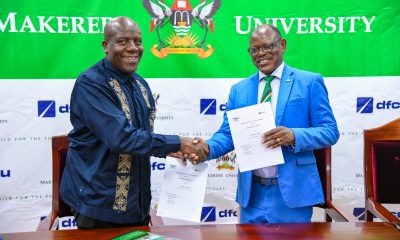

Press Release: Mak & DFCU Partner to Enhance Higher Education, Research & Student Support
-
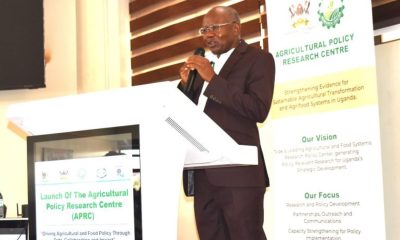

APRC Trains Graduate Students & Stakeholders in the Use of the African Agriculture Adaptation Atlas
-
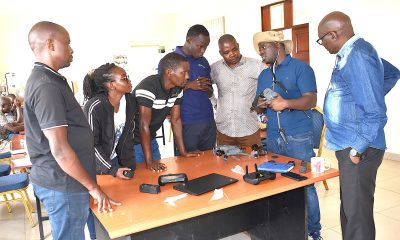

NbS4Tea Project Team Makes Great Progress, Deploys Drones for Data Collection
Agriculture & Environment
Mak Moves to Revitalize Food Technology & Business Incubation Centre to Drive Innovation & Entrepreneurship
Published
5 days agoon
July 14, 2025By
Mak Editor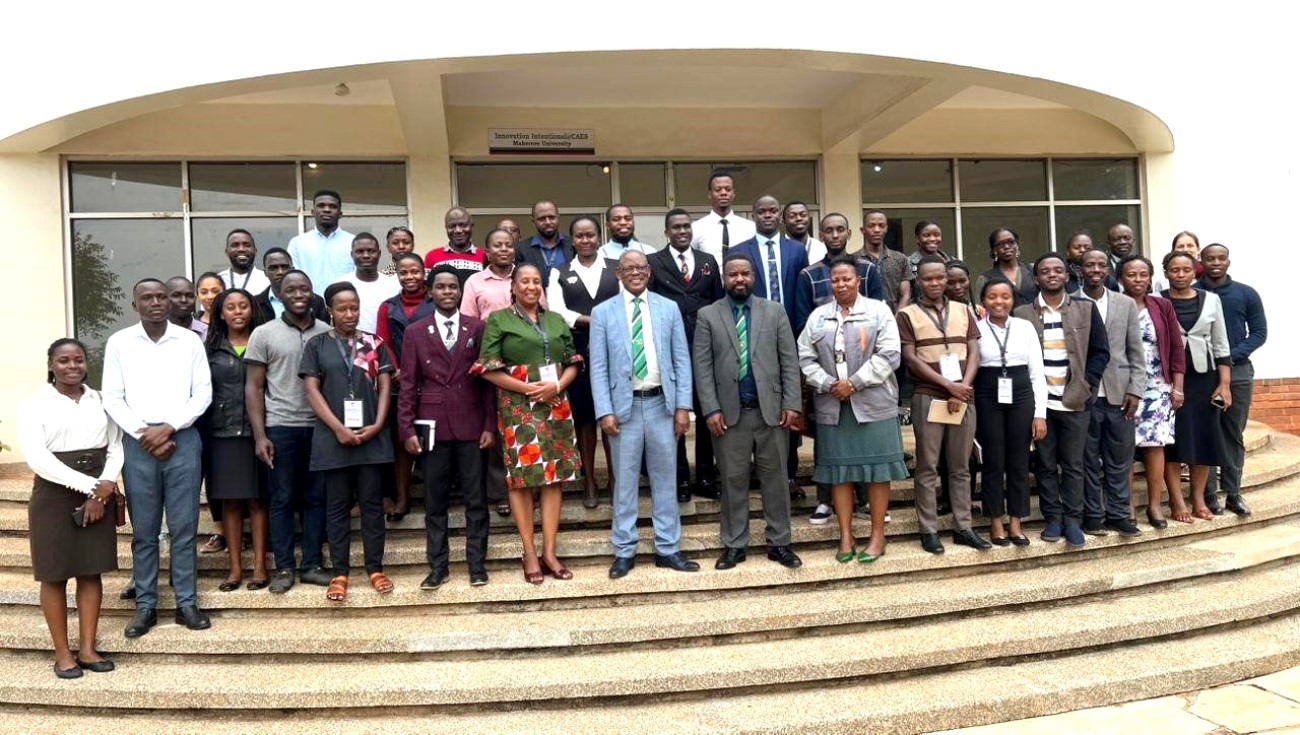
By Ssembogga Derrick
Makerere University marked a significant milestone on Thursday, 10th July 2025, with the launch of the revitalization programme for the Food Technology and Business Incubation Centre (FTBIC). This initiative is poised to position the FTBIC as a national hub for food innovation, student enterprise development, and agro-industrial transformation.
Hosted under the School of Food Technology, Nutrition and Bioengineering (SFTNB) at the College of the Agricultural and Environmental Sciences (CAES), the revitalization of the FTBIC is intended to bridge the gap between academia and industry. “We aim to achieve this by supporting food-based start-ups, enhancing graduate entrepreneurship, and promoting the commercialization of research,” Dr Julia Kigozi, Dean, SFTNB explained. The project receives critical funding from the Makerere University Research and Innovations Fund (MakRIF), which consistently supports innovation and research-based development at the university.
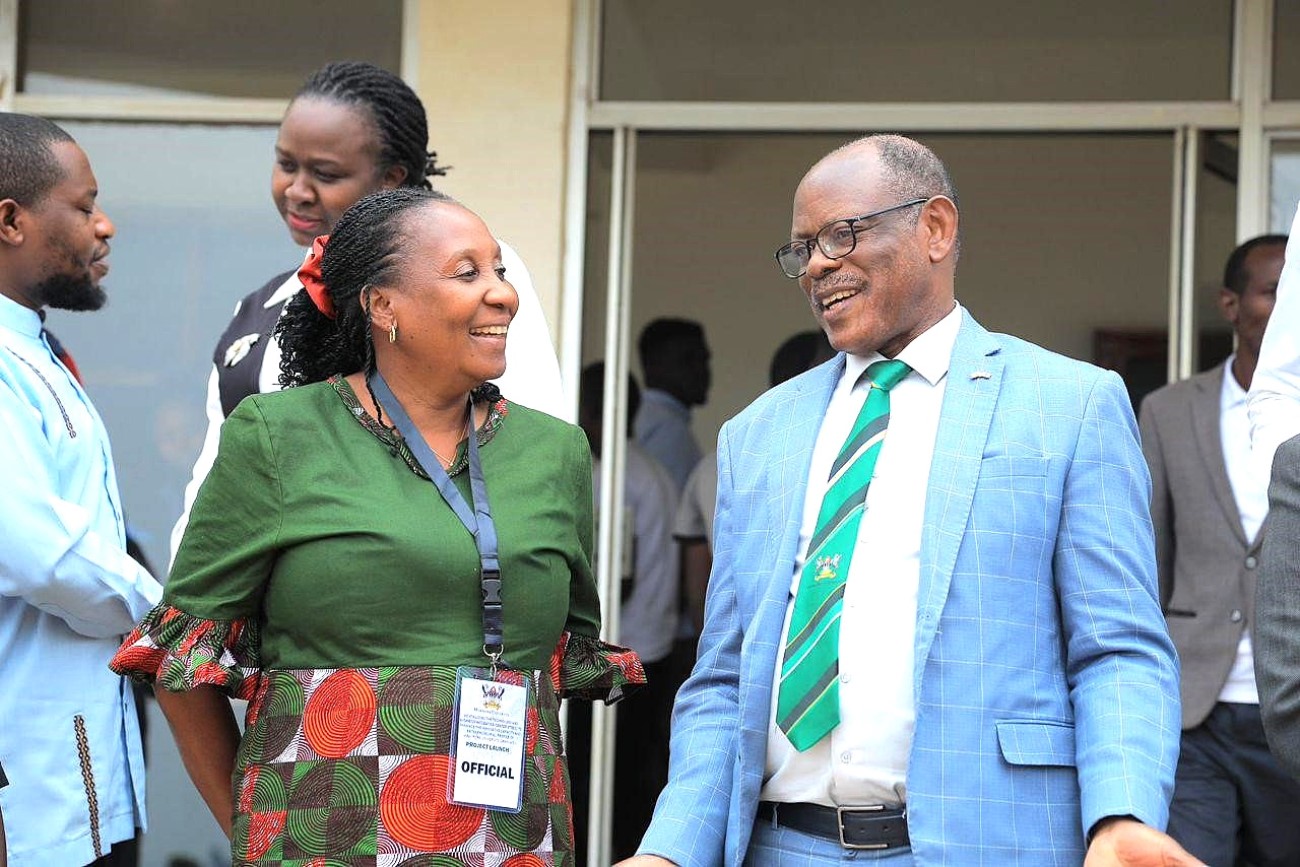
Unveiling a New Strategic Vision
The event, held under the theme “Revitalizing FTBIC to Unlock Innovation and Entrepreneurship Potential among Makerere University Graduates”, marked the official launch of the Centre’s revitalization programme to key stakeholders. It featured the presentation of FTBIC’s new strategic vision and direction, highlighting the commitment of the institution and its partners to fostering graduate entrepreneurship and innovation in food systems. The event also aimed to raise awareness of the Centre’s crucial role in supporting industry, research, and national development.
Participation of stakeholders
The launch attracted a vibrant and diverse audience of over 50 participants. Among the attendees were student representatives; partners from other incubation centers both within and outside Makerere University, including MIIC, UNIPOD, and DGI; as well as representatives from national innovation stakeholders such as Uganda Industrial Research Institute (UIRI) and StartHub Africa.
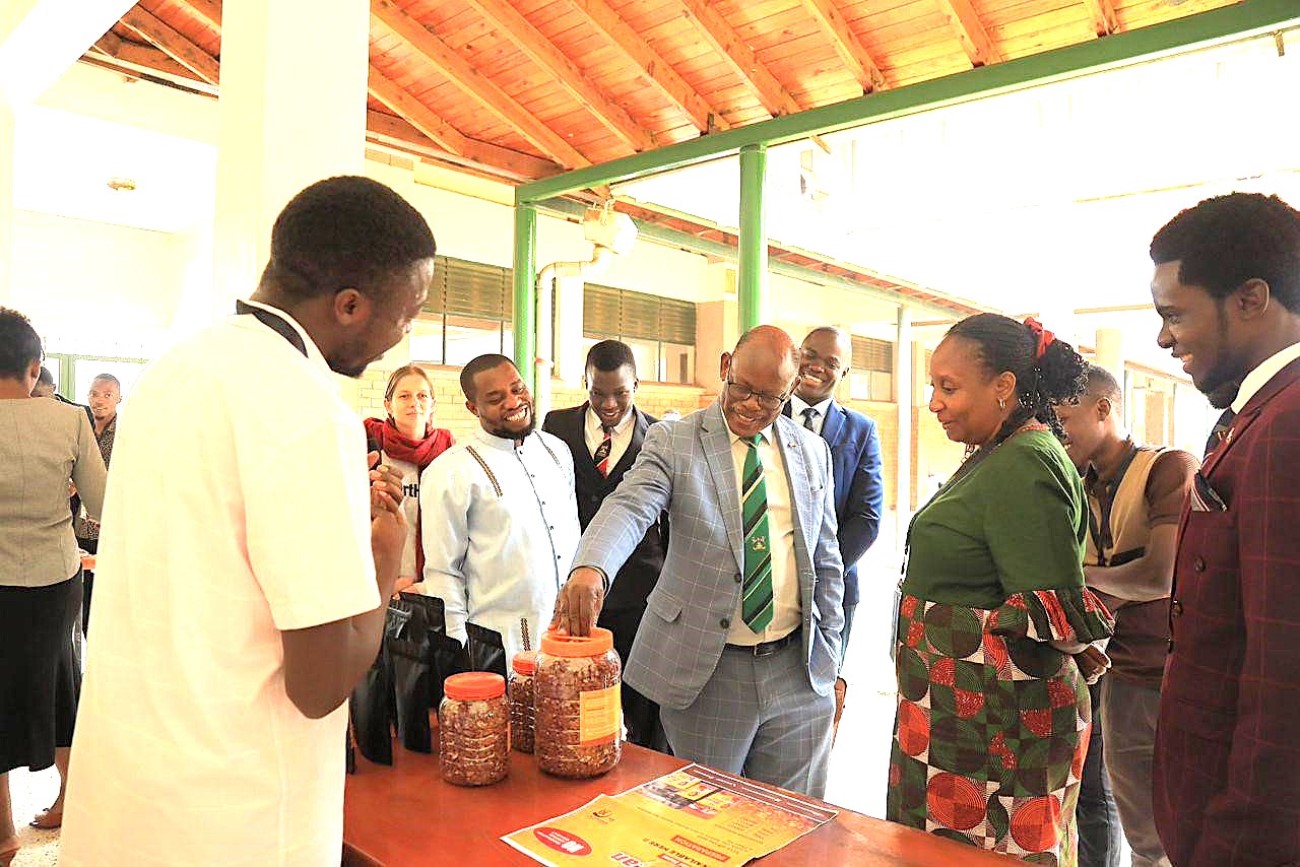
Most notably, the event was honored by the presence of the Vice Chancellor of Makerere University Prof. Barnabas Nawangwe. The Vice Chancellor commended the revitalization efforts, acknowledging the Centre’s immense potential to incubate hundreds of food-based start-ups and create employment opportunities for thousands of graduates. “The Centre is now well-positioned to become a flagship platform for innovation, employment creation, and agro-industrial development in Uganda and beyond. Makerere University remains committed to supporting such initiatives that align with national priorities and global development goals.”
The event featured the unveiling of the operational framework for the revitalized Centre, highlighting its commitment to innovation, entrepreneurship, and practical graduate training. Stakeholders in attendance expressed enthusiasm and pledged support for future collaboration, research, and product development initiatives aligned with national development priorities. The event also provided a platform to deepen partnerships with private sector actors and development organizations, reinforcing confidence in the Centre’s potential to serve as a national model for university-led incubation.
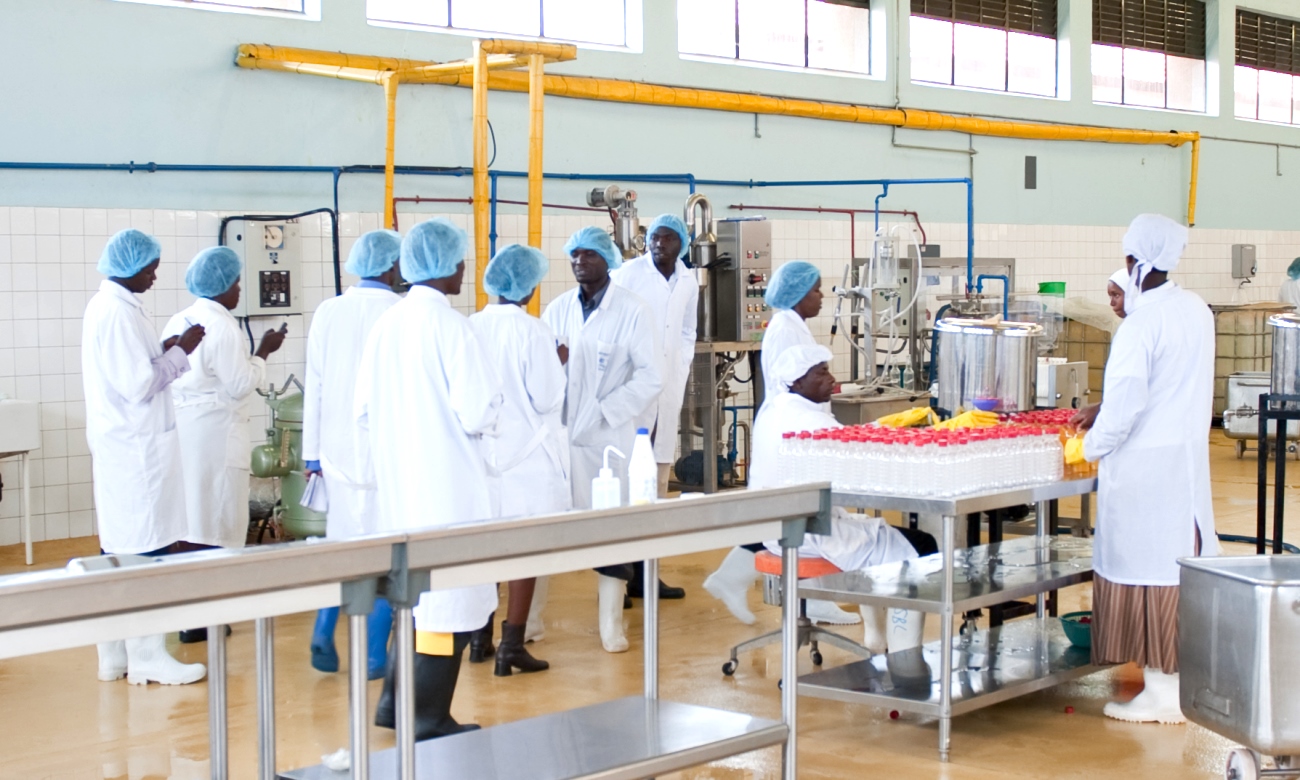
Agriculture & Environment
SophiA Project Upgrades Medical Infrastructure at Buvuma Health Centre IV, Trains Technicians for Maintenance Works
Published
1 week agoon
July 9, 2025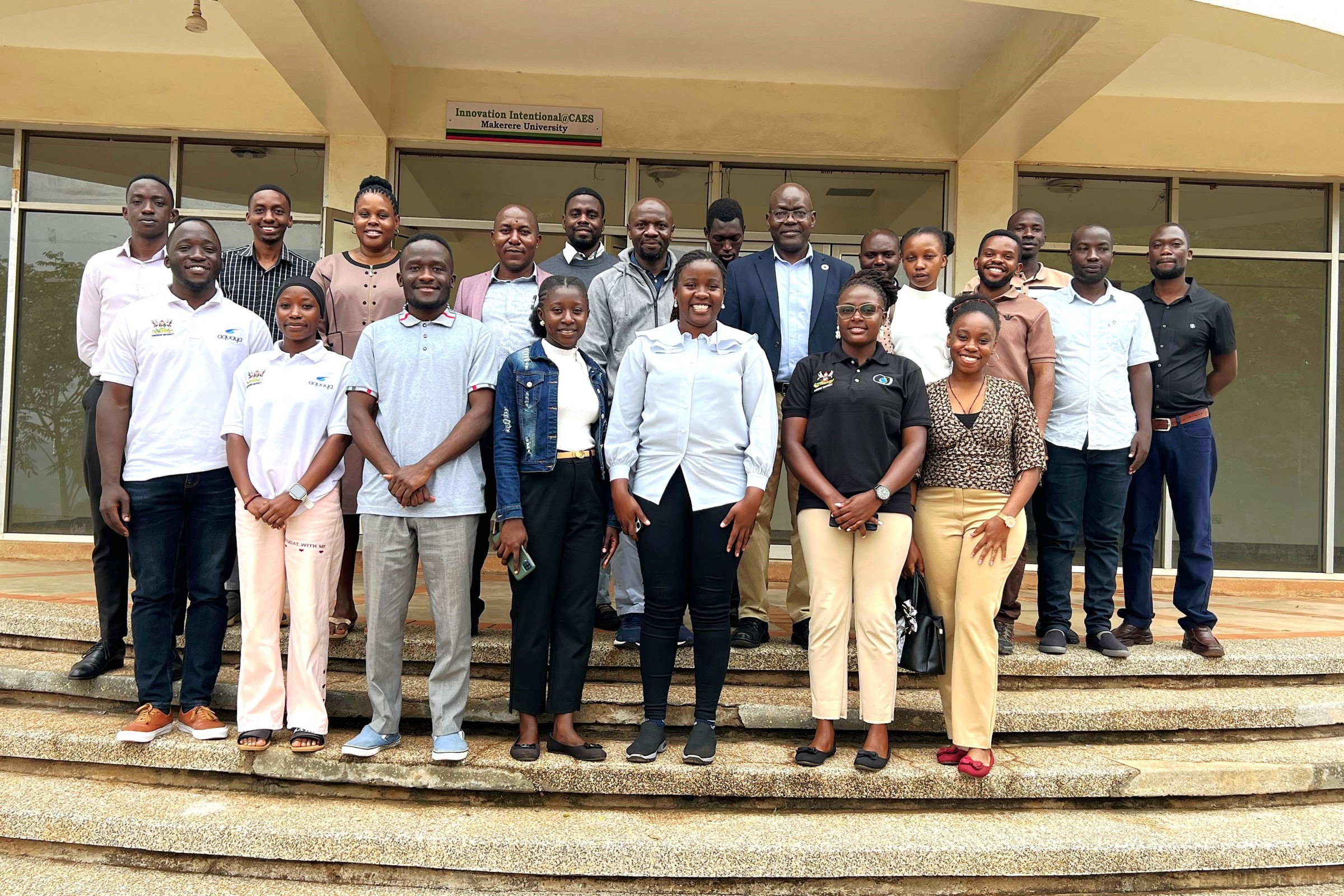
Overview of the Sustainable Off-Grid Solutions for Pharmacies and Hospitals in Africa (SophiA) Project
Despite ongoing urbanization across Africa, the majority of the population still resides in rural and remote areas, where infrastructure development remains limited. These regions face significant challenges such as lack of access to healthcare, education, clean water, and reliable electricity, contributing to higher rates of illness and poverty compared to urban centres. According to reports, Sub-Saharan Africa has approximately 120,000 public health facilities (22,000 hospitals and 98,000 health posts), of which around 26% lack any electricity access, and only 28% have reliable power supply.
Access to good healthcare is critical for sustainable development. However, many rural medical centres operate under harsh conditions – using polluted water, lacking cooling for medicines, and facing poor sanitation – largely due to unreliable electricity and water supply. Although half of the population in Sub-Saharan Africa lacks electricity, the region has abundant renewable energy potential that can be effectively harnessed through off-grid solar photovoltaic (PV) systems.
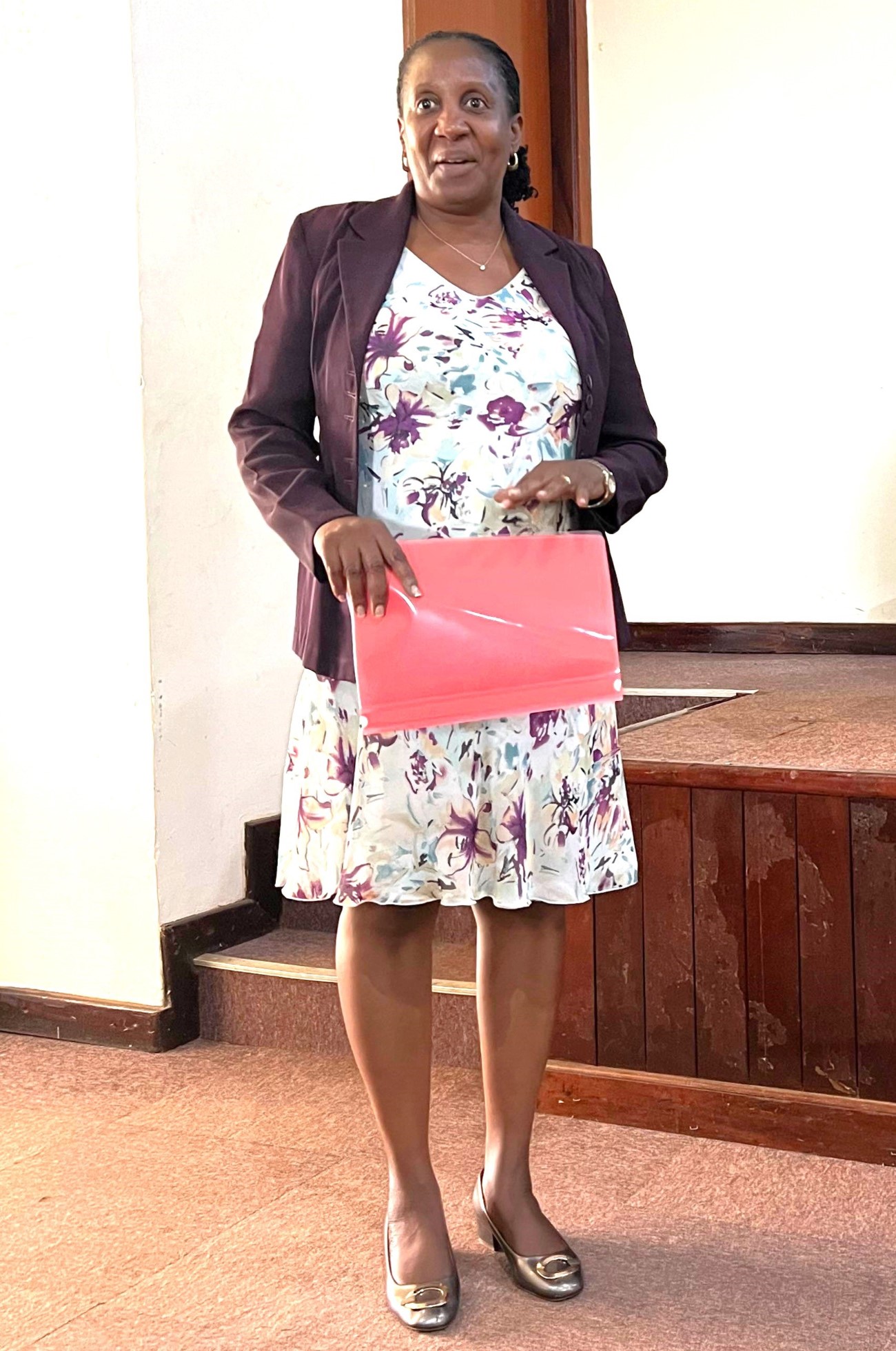
To address the above-mentioned challenges facing the African Continent, Makerere University in partnership with 13 organizations across Europe and Africa developed a project titled, “Sustainable Off-grid solutions for Pharmacies and Hospitals in Africa (SophiA)”. The five-year project that began on 1st October 2021 is funded by the European Union (Project: 101036836 – SophiA – H2020-LC-GD-2-3-2020). At Makerere University, the project is coordinated by Dr. Nicholas Kiggundu, Associate Professor in the Department of Agricultural and Biosystems Engineering, College of Agricultural and Environmental Sciences (CAES).
Piloted in Burkina Faso, Cameroon, Malawi, and Uganda, SophiA aims to provide sustainable off-grid energy solutions to rural and remote health facilities, fostering economic growth and ensuring equitable access to energy and healthcare. Using various technologies, such as photovoltaics, solar thermal, electrical and thermal storage, water treatment and natural refrigerants with low global warming potential, SophiA has developed and manufactured locally innovative, modular, affordable and efficient solar powered systems for providing:
- Safe and clean drinking water, free of bacteria and viruses, and deionised water for medical purposes;
- Hot water and steam production for thermal requirements of the hospitals;
- Cooling of medicines and food at +5°C;
- Low temperature storage of blood plasma and vaccines at -30°C;
- Ultra-low temperature storage of sensitive medication (e.g. some Covid-19 or Ebola vaccines) at -70°C.
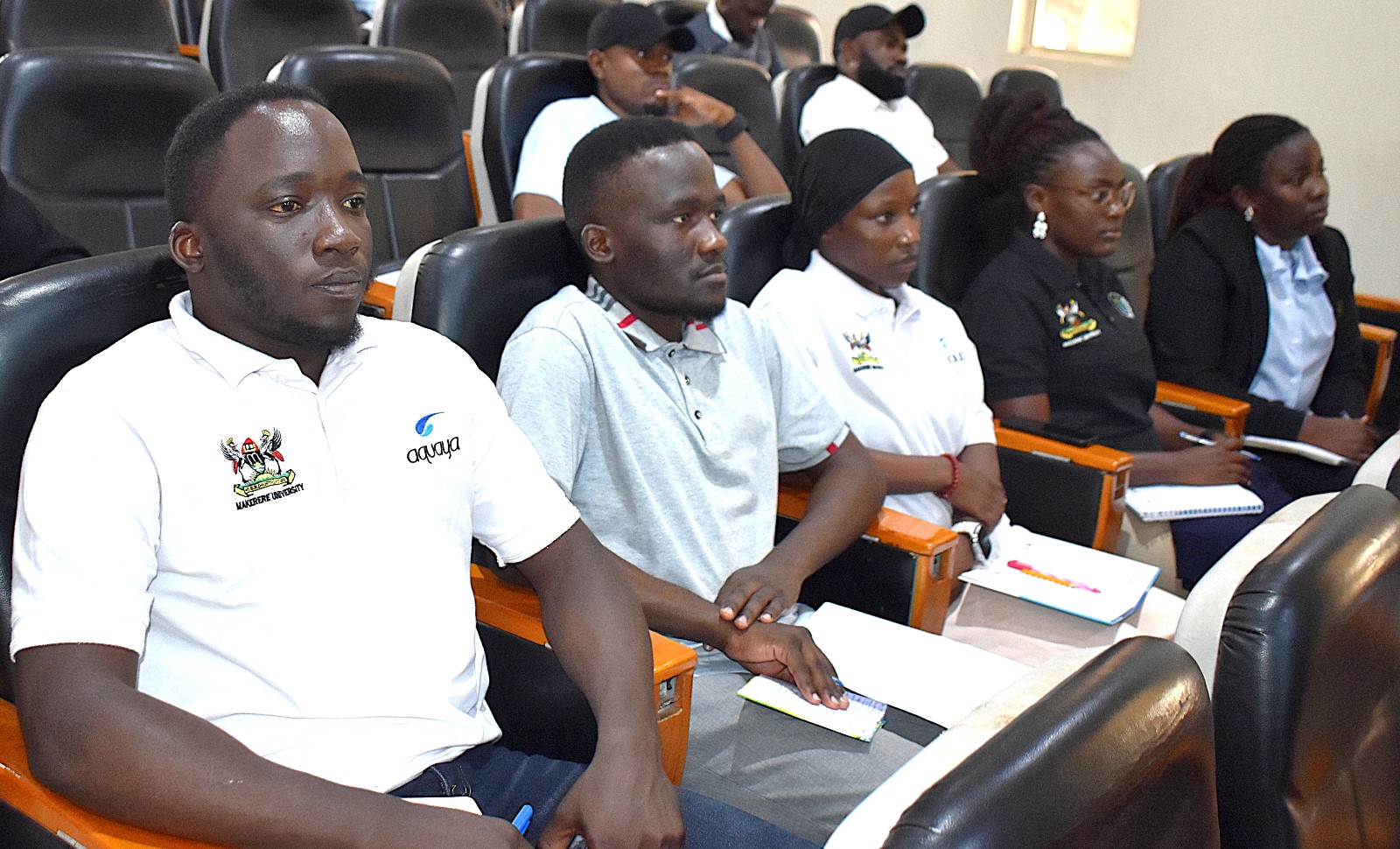
In addition, PV MedPort, a simple and 100% solar-powered solution has been developed and tested as a mobile health care station in small remote areas in 4 different geographical conditions in Africa. The SophiA system has been manufactured in Africa and will provide, for the first-time, innovative solutions based on climate-friendly natural refrigerants to cover cooling demand for three different temperature ranges (-70°C, -30°C and +5°C). The system has been tested and demonstrated at four rural hospitals in remote regions throughout the African continent covering the major geographical regions and different climatic conditions in Burkina Faso, Cameroon, Malawi and Uganda.
SophiA Project initiatives in Uganda
In Uganda, all Health Centre IV hospitals with surgical theatres have been connected to the national grid except Buvuma Health Centre IV, which serves over 120,000 people scattered across 52 islands. Recognizing this gap, the Ministry of Health selected Buvuma Health Centre IV for the SophiA project to demonstrate sustainable off-grid solutions.
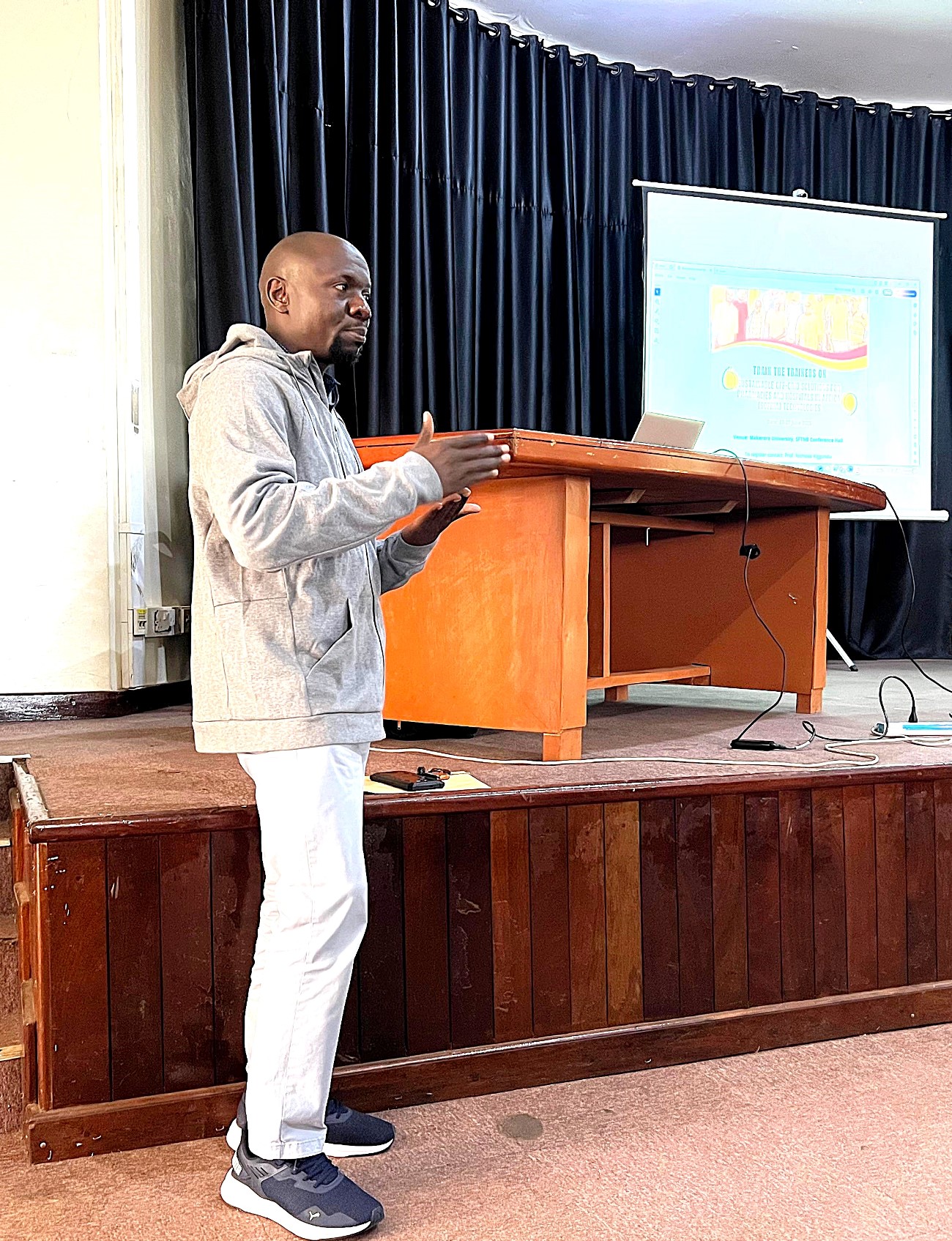
The SophiA System at Buvuma Health Centre IV provides the following services:
- Off-grid electricity supply
- Safe, clean drinking water for patients, staff, and the community
- Hot water and steam systems crucial for maternal care
- Solar-powered cooking and meal preparation
- Cooling systems for surgery and intensive care units
- Refrigeration for medicines at +5°C, blood plasma storage at -30°C, and ultra-low temperature storage (-70°C) for sensitive vaccines such as those for COVID-19 and Ebola
Training of Trainers Workshop
As the SophiA project approaches completion in September 2025, it is vital to establish a skilled pool of technicians capable of handling maintenance and minor repairs of the system components, including solar panels, water treatment units, generators, batteries, and cooking kits.
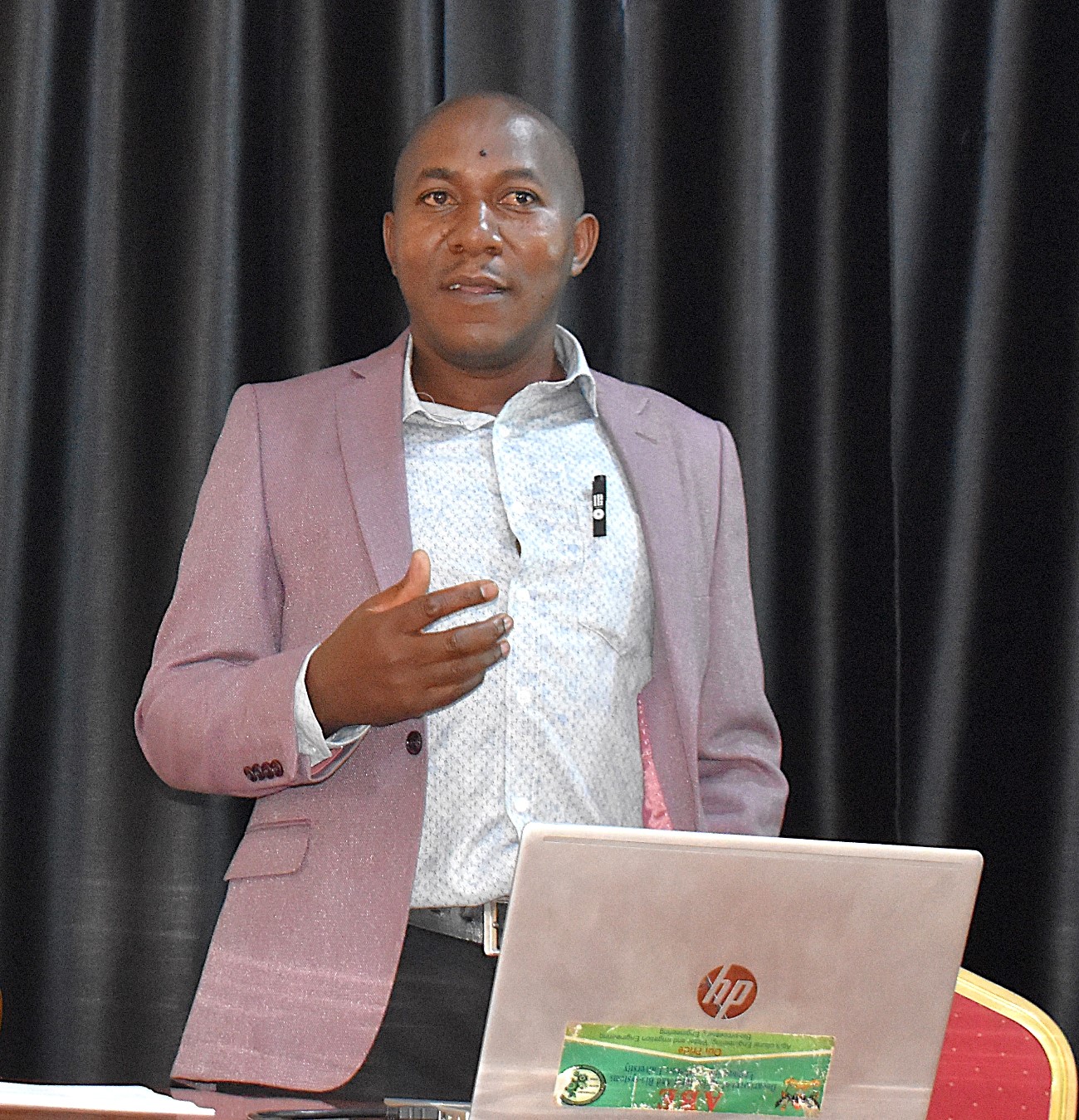
From June 23 to 27, 2025, Makerere University hosted a comprehensive Training of Trainers workshop. The training programme encompassed a diverse range of topics delivered by subject matter experts from institutions, including Makerere University (Department of Agricultural and Biosystems Engineering – CAES, and the College of Engineering, Design, Art and Technology – CEDAT), Hochschule University of Applied Sciences, and Busitema University. Participants were carefully selected from diverse professional backgrounds, including recent engineering graduates from CAES and CEDAT, Makerere University, University technical staff, personnel from Kyambogo University, officials from Buvuma District Works and Health Departments, and electricians from Kampala City. The training sessions were conducted at Makerere University and Buvuma Health Centre IV Hospital.
Training Modules Included:
- Sustainable energy systems and their practical applications
- Energy generation and storage technologies
- Solar water heating: design, operation, maintenance, and performance optimization of solar water heaters, crop dryers, and concentrating solar heaters
- Solar PV technologies in Uganda: cell technology, system design, operations, maintenance, and hands-on practicals for standalone and grid-connected systems
- Public health implications of water quality
- Water treatment and quality management, including protocols, parameters, and case study on the MCDI treatment system
- Water quality testing methodologies
- Introduction to sustainable refrigeration and cooling technologies
- Environmental impact and safety considerations for refrigerants
- Refrigeration cycles and component overview
- Life cycle assessment of SophiA technologies
- Thermal energy storage within the SophiA system
- Steam as a productive energy source
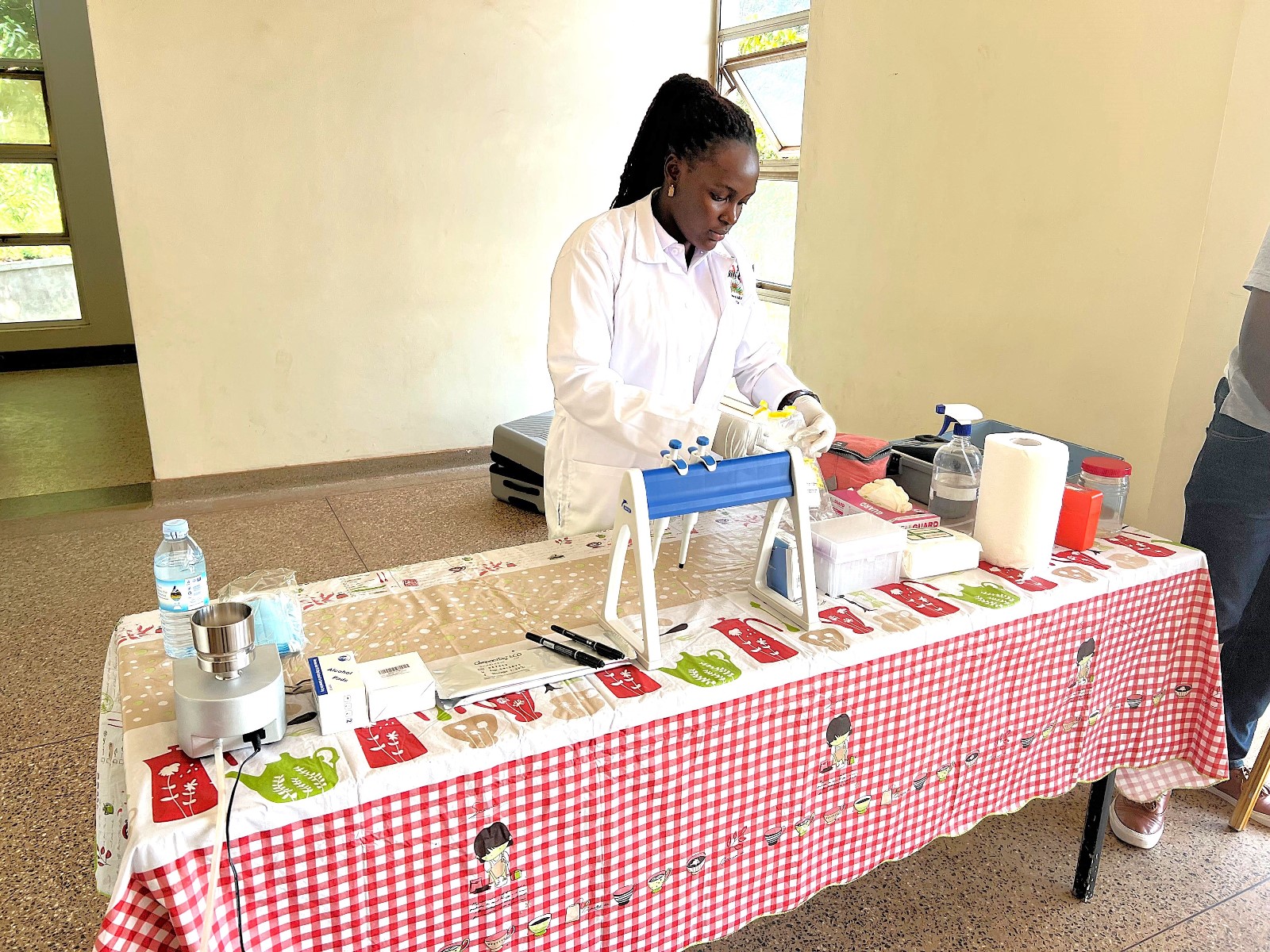
The Training Sessions
Day One: Introduction to foundational concepts in solar energy technologies
The first day of the SophiA Train the Trainers Workshop focused on building foundational knowledge in sustainable and solar energy systems. Led by Dr. Peter Tumutegyereize and Dr. Francis Mujjuni, participants explored a range of technologies and applications critical to clean energy deployment.
Key topics included:
Sustainable Energy Systems: Introduction to renewable energy systems including bioenergy, hydro, wind, geothermal, hydrogen fuel cells, and battery storage.
Solar Radiation & Geometry: Understanding solar constants, irradiance, and the impact of atmospheric conditions on solar performance.
Solar Thermal Technologies: Detailed look at solar water heating systems (FPCs and ETCs), maintenance, sizing, and solar dryers for agricultural and industrial use.
Photovoltaic (PV) Systems: Working principles, types of PV cells, performance factors, and diagnostics. Practical testing techniques and metrics like Voc, Isc, MPP, and PR were discussed.
Simulation & Application: Olivia Nakiwanuka demonstrated a PVsyst-based simulation of a 2.55 kWp standalone system for a conference hall, showing a high solar fraction (97.88%) and low LCOE (USD 0.03/kWh).
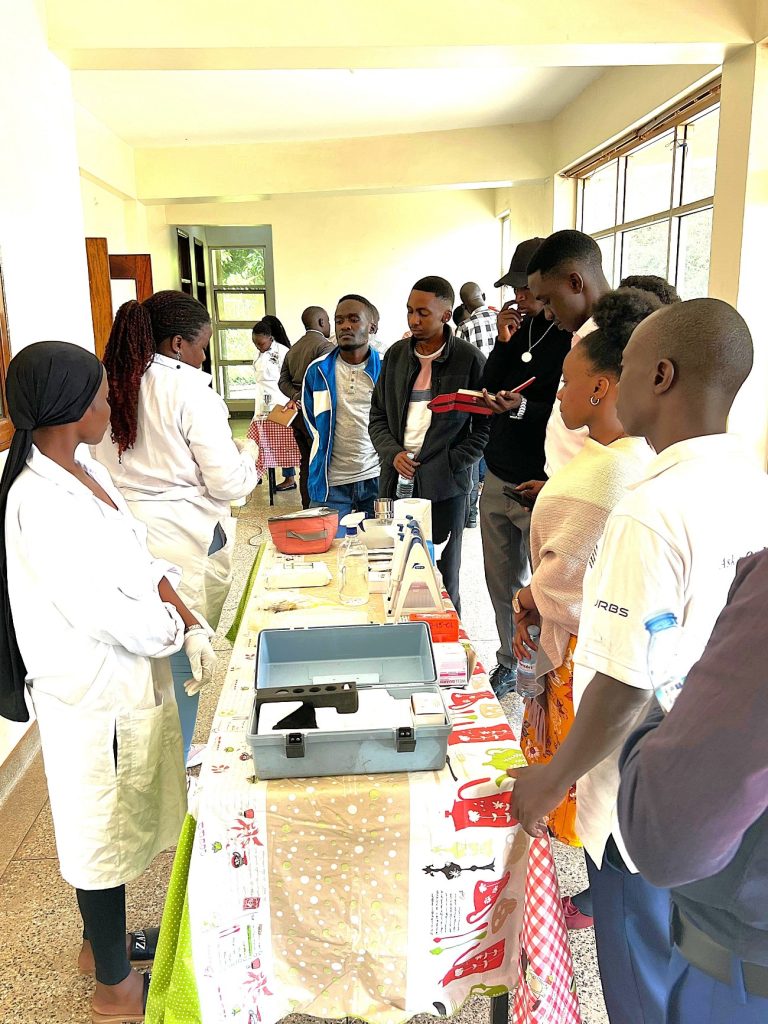
The sessions emphasized practical skills, performance analysis, and real-world application, equipping participants to train others and support solar adoption, especially in rural and off-grid settings.
Day Two: Water Treatment Technologies
The second day focused on water treatment technologies relevant to low-resource healthcare settings. Facilitated by Sneha De and Mr. Duc Dinh Ngoc from Hochschule Karlsruhe University, sessions covered technical, environmental, and operational challenges, with contributions from Dr. Joshua Wanyama on water quality management and Dr. Prossie Nakawuka on practical water testing.
Key challenges addressed included unreliable water supply and contamination in healthcare facilities, emphasizing the need for decentralized water treatment, especially in rural areas.
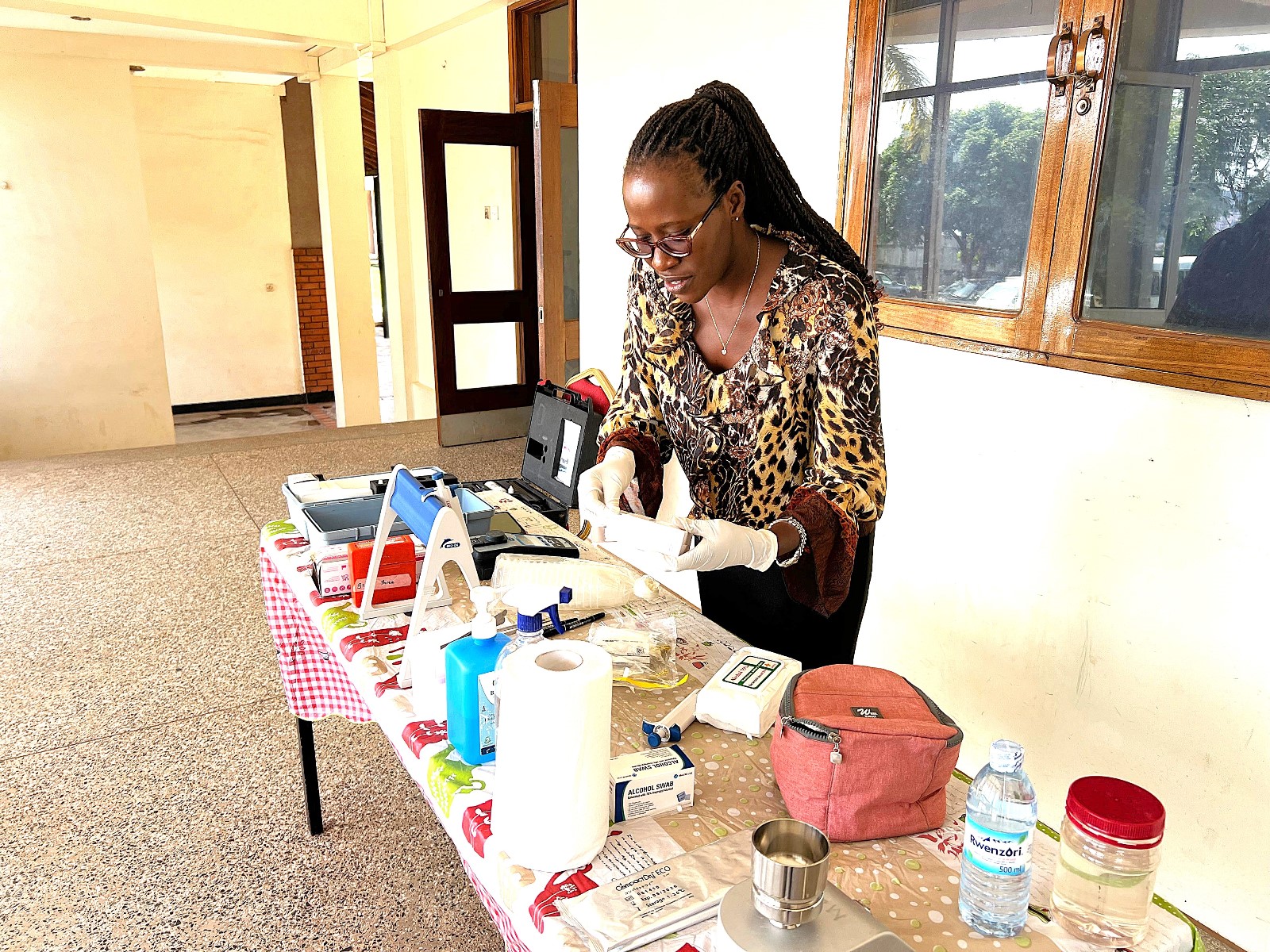
Sneha De reviewed biological and physical/chemical water treatment methods, highlighting technologies such as activated sludge, filtration, membrane bioreactors, and advanced disinfection techniques. The SophiA modular water treatment system, integrating ultrafiltration and membrane capacitive deionisation (MCDI), was introduced as a scalable solution for producing safe drinking and deionised water for medical use.
Mr. Duc Dinh Ngoc trained participants on the MCDI technology, an energy-efficient method for salt and fluoride removal suitable for low-salinity water.
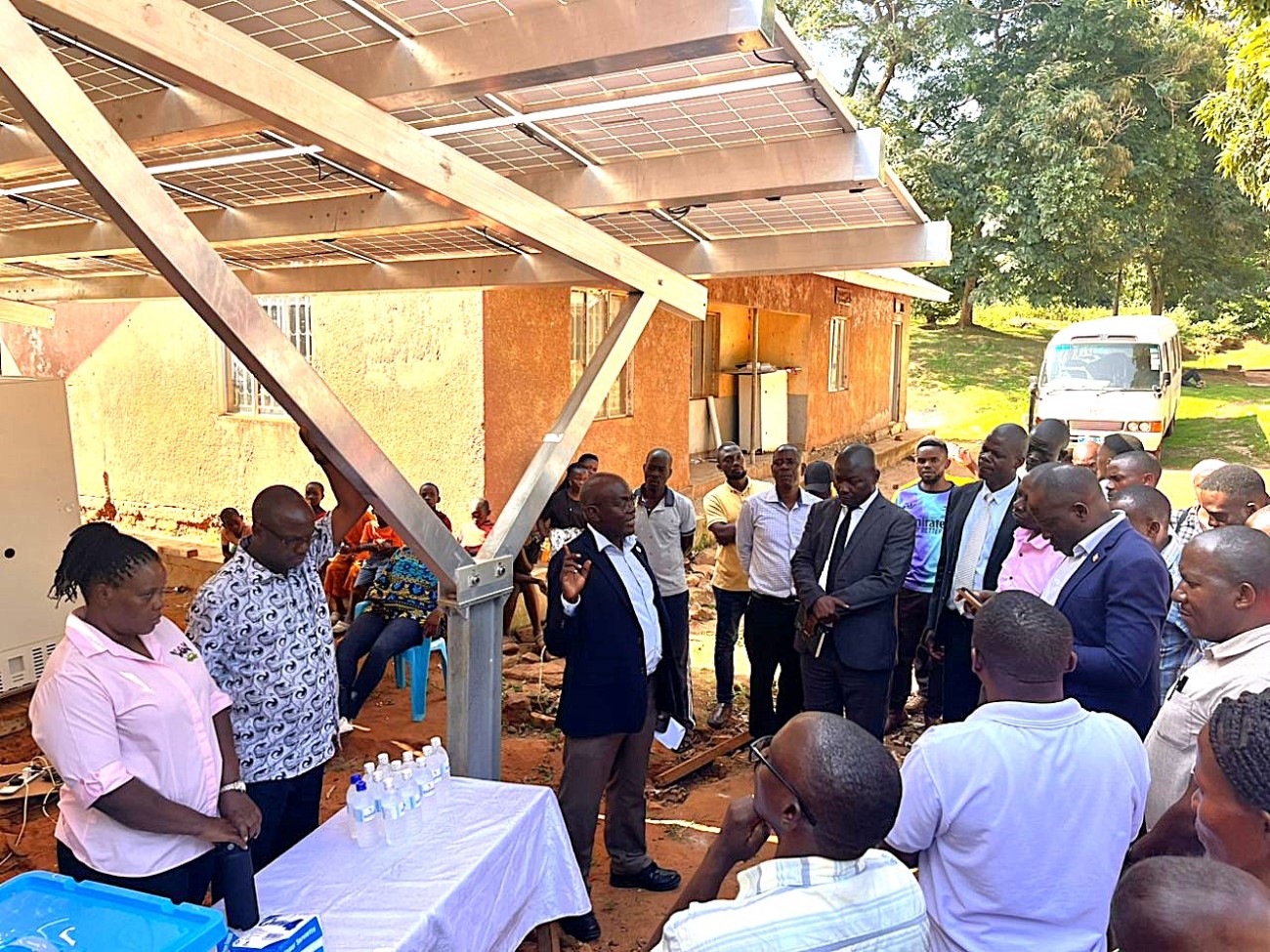
Dr. Joshua Wanyama discussed the water quality management protocols, outlining key physical, chemical, and biological water parameters and monitoring strategies, including modern IoT-based tools, to ensure water safety and public health.
The day concluded with a hands-on lab session by Dr. Prossie Nakawuka, where participants practiced water quality testing using turbidimeters, incubators, and filtration techniques.
Overall, Day Two combined theoretical insights, technology demonstrations, and practical skills, preparing participants to implement sustainable water treatment and quality management systems in healthcare environments.
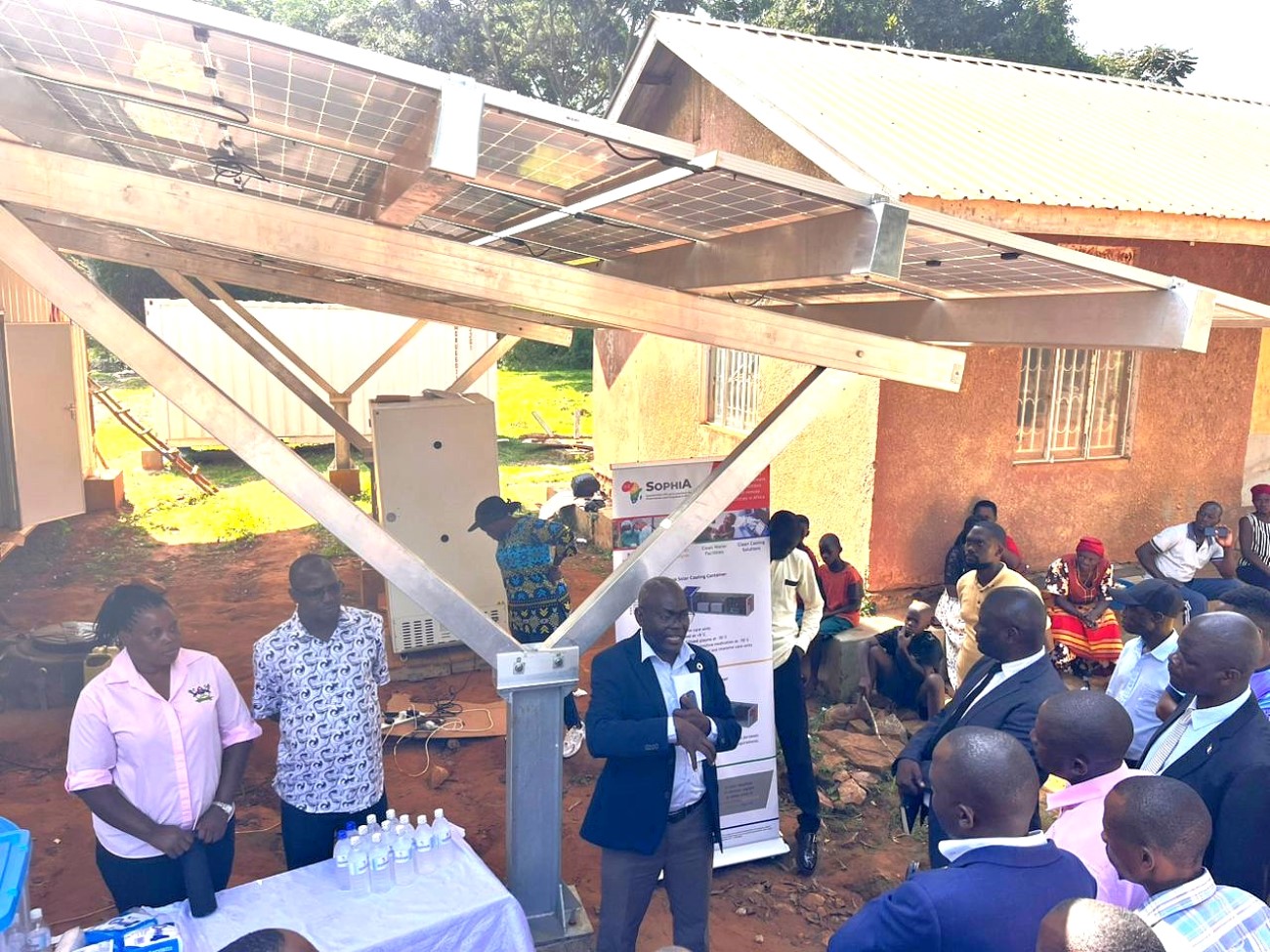
Day Three: Refrigeration and Cold Storage
The third day of the SophiA workshop focused on sustainable refrigeration and cold storage technologies tailored for healthcare in Sub-Saharan Africa. Experts discussed energy-efficient, climate-friendly cooling solutions vital for vaccine storage, medicines, and diagnostics, especially in off-grid and rural settings.
Key highlights included the introduction of solar-powered and biomass-based refrigeration systems, thermal energy storage methods, and the use of natural refrigerants like propane, ammonia, and CO₂ as environmentally safer alternatives. Presentations emphasized the critical role of refrigeration in healthcare and the urgent need to replace harmful chemicals with sustainable technologies.
Sessions covered real-world applications such as the SophiA cooling containers in Burkina Faso, safety protocols for flammable refrigerants, and the environmental and economic benefits of solar refrigeration systems assessed through life cycle analysis.
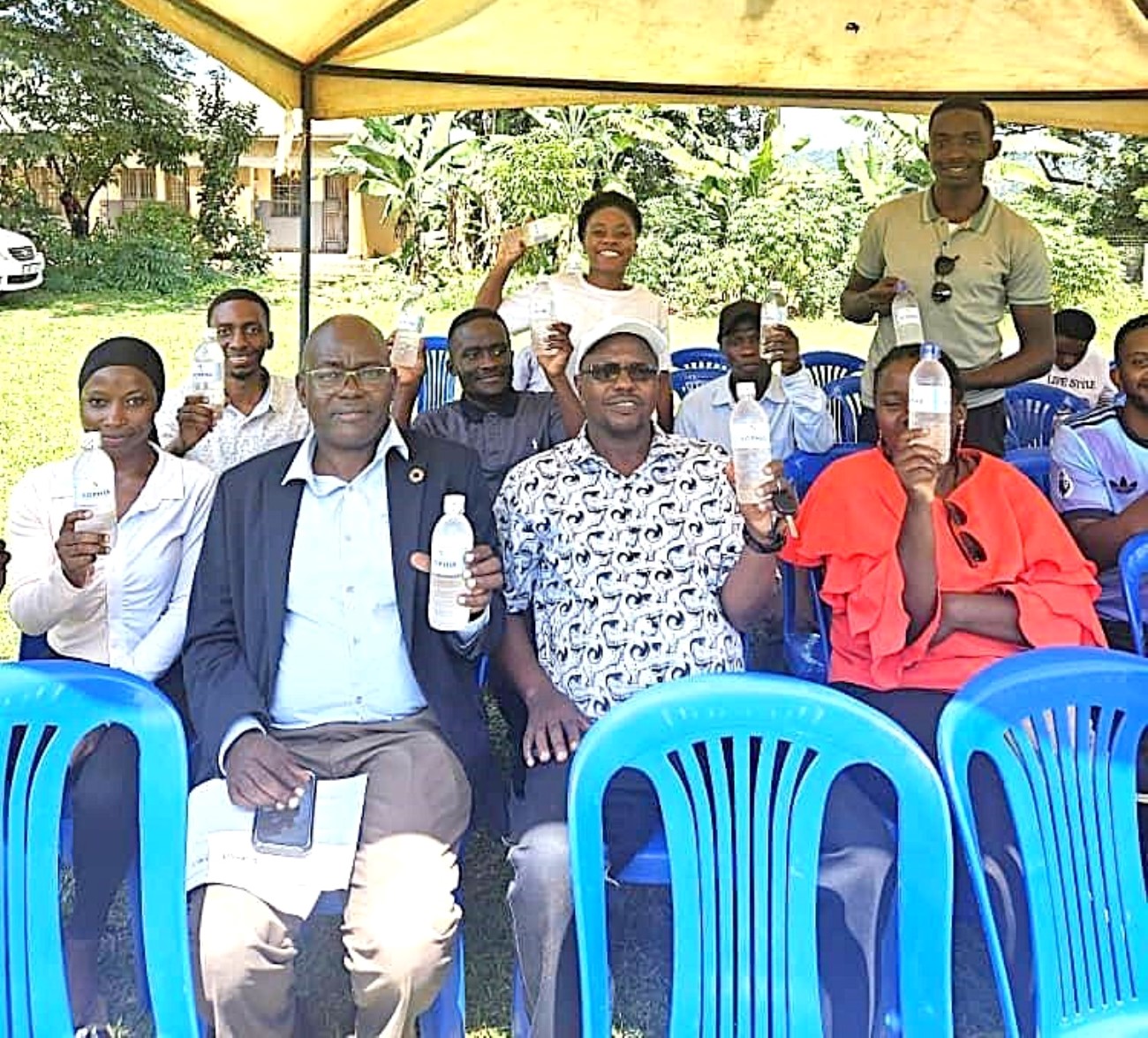
The day ended with an interactive quiz and discussion, reinforcing learning and encouraging participants to apply sustainable cooling practices in their communities.
Day Four: World Refrigeration Day & Field Visit to Buvuma Island
The fourth day of the SophiA Train the Trainers workshop was dedicated to the celebration of the World Refrigeration Day and a field excursion to Buvuma Island, providing participants with a unique opportunity to witness the SophiA system in action. The day was coordinated by Dr. Sarah Bimbona and Dr. Nicholas Kiggundu, who led the delegation to Buvuma Health Centre IV, the pilot site for the SophiA installation in Uganda.
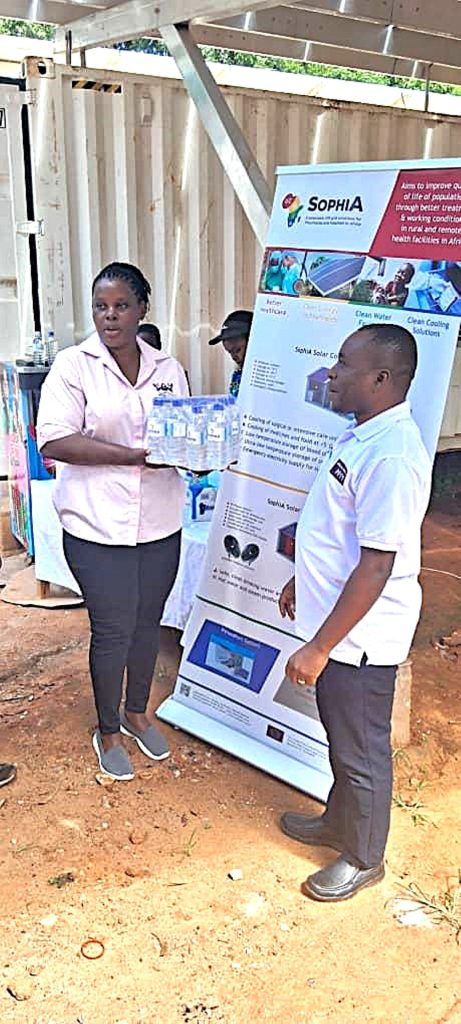
The visit served as both a practical extension of the previous day’s technical sessions and a community engagement event. Participants were able to observe the installed SophiA system, which integrates solar-powered refrigeration, water treatment and steam generation technologies designed for off-grid healthcare settings. During the visit, Dr. Kiggundu provided a detailed briefing to local stakeholders, including representatives from the Buvuma District Local Government, delegates from the Buganda Kingdom, and members of the local community. He explained how the SophiA system will enhance healthcare delivery on the island through reliable cold storage for vaccines and medicines, access to clean drinking water, and steam generated for cooking and use in the maternity wards.
As part of the long-term sustainability plan for the SophiA system, the launch of SophiA Water was announced, an entrepreneurial initiative designed to generate revenue locally for the operation and maintenance of the system.
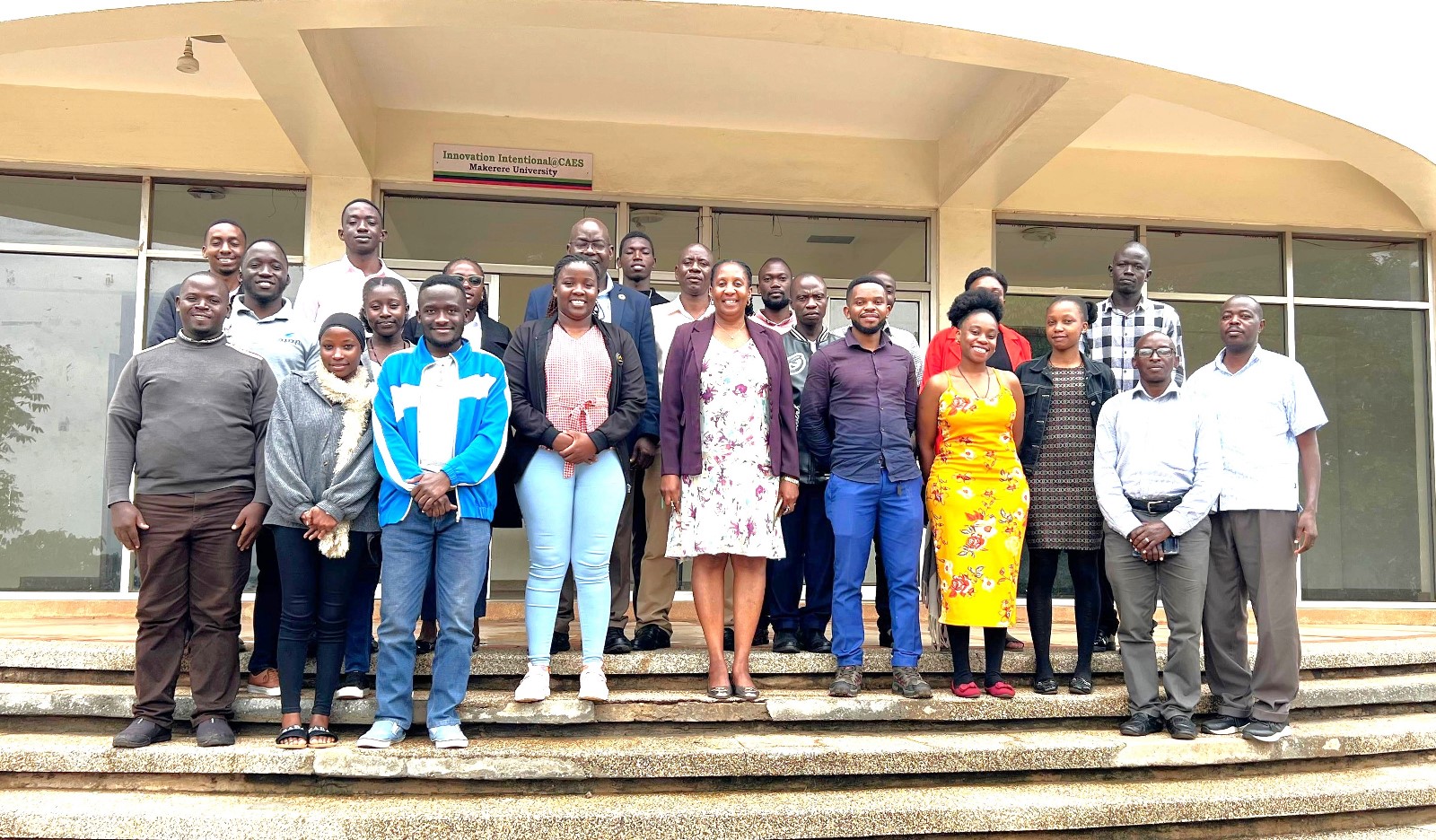
The field trip ended with a certificate awarding ceremony in appreciation of the participants’ dedication and active engagement throughout the training programme.
Agriculture & Environment
APRC Trains Graduate Students & Stakeholders in the Use of the African Agriculture Adaptation Atlas
Published
2 weeks agoon
July 3, 2025
The Agricultural Policy Research Centre (APRC), housed within the College of Agricultural and Environmental Sciences (CAES) at Makerere University, continues to play a pivotal role in shaping Uganda’s agricultural future through evidence-based policymaking. With a mission to ensure that agricultural policies are grounded in empirical research and data, APRC is actively investing in capacity-building initiatives that empower researchers, policymakers, and development actors.
In a significant stride toward building climate resilience in African agriculture, APRC recently organized a two-day intensive training workshop focused on the African Agriculture Adaptation Atlas (AAAA) – a state-of-the-art, web-based decision-support platform that facilitates the integration of climate data into agricultural planning and policy.

The workshop, held on Wednesday 25th and Thursday 26th June 2025 at the School of Agricultural Sciences, Makerere University, targeted two key groups: graduate students on the first day, and university faculty, government officials, and development practitioners on the second. This structure ensured tailored learning experiences for both emerging and seasoned professionals, helping to bridge the gap between academic research and real-world policy implementation.
The African Agriculture Adaptation Atlas (AAAA) is designed to provide dynamic, data-rich visualizations that support informed decision-making in agriculture and food systems across the continent. Through interactive maps and analytical tools, users can explore projected climate impacts, evaluate risks, and identify localized, climate-smart adaptation strategies.

Throughout the sessions, participants received hands-on training in a broad range of AAAA functionalities, including:
- Leveraging the Atlas for research and policy communication: Enhancing the ability of scientists and policy actors to translate complex climate data into actionable insights;
- Assessing projected climate impacts and associated agricultural risks: Essential for forward-looking planning and risk mitigation;
- Identifying climate-smart investment options, with a particular focus on the livestock sector, which is especially vulnerable to climate shocks;
- Analysing gendered vulnerabilities: Examining how climate change disproportionately affects women in agricultural communities;
- Understanding the implications of heat stress on agricultural productivity: Supporting targeted interventions to protect producers and their livelihoods;
- Estimating the economic returns of adaptation strategies: Aiding in prioritizing investments and allocating limited resources effectively.

Prof. Bernard Bashaasha, the APRC Coordinator, emphasized the importance of the training in advancing Africa’s adaptation agenda. “As climate change continues to threaten food security and disrupt livelihoods across the continent, tools like the AAAA, and the skills to use them effectively are essential. They empower decision-makers to craft policies that are adaptive, inclusive, and rooted in science,” he noted.
The workshop was coordinated by Dr. Florence Rwiza, Lecturer in the Department of Agribusiness and Natural Resource Economics at CAES.
More photos from the Training






Trending
-

 General2 weeks ago
General2 weeks agoRe-advert: Admission to Undergraduate Programmes 2025/2026
-

 General1 week ago
General1 week agoRe-Advert for Applications for Diploma and Certificate Training
-

 General5 days ago
General5 days agoMakerere University Fees Waiver for 40 First Year Female Students 2025/2026
-

 General2 weeks ago
General2 weeks agoPress Statement on Ranking
-

 Health1 week ago
Health1 week agoCall for Applications: Responsible Conduct of Research (RCR) Training Course
